Search Result
Results for "
S phase arrest
" in MedChemExpress (MCE) Product Catalog:
1
Biochemical Assay Reagents
7
Isotope-Labeled Compounds
| Cat. No. |
Product Name |
Target |
Research Areas |
Chemical Structure |
-
- HY-N10268
-
|
NSC 299113
|
Apoptosis
|
Cancer
|
|
3-Hydroxyterphenyllin is a metabolite of Aspergillus candidus.3-Hydroxyterphenyllin suppresses proliferation and causes cytotoxicity against A2780/CP70 and OVCAR-3 cells. 3-Hydroxyterphenyllin induces S phase arrest and apoptosis. 3-Hydroxyterphenyllin has the potential for the research of ovarian cancer .
|
-
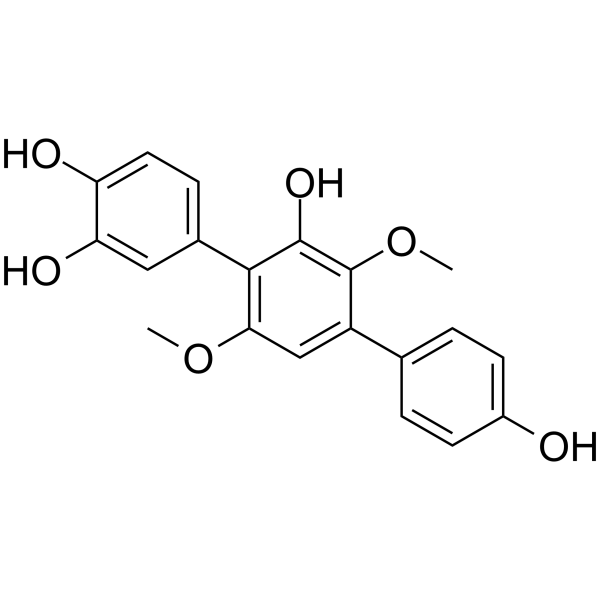
-
- HY-147913
-
|
|
PI3K
Akt
mTOR
Apoptosis
|
Cancer
|
|
PI3K/Akt/mTOR-IN-3 (compound 3d) is a potent PI3K/AKT/mTOR inhibitor. PI3K/Akt/mTOR-IN-3 displays the inhibitory activity in MCF-7, HeLa and HepG2 cells, with IC50 values of 0.77, 1.23, and 4.57μM, respectively. PI3K/Akt/mTOR-IN-3 inhibits the migration of MCF-7 and HeLa cells at the concentration of 4 μM. PI3K/Akt/mTOR-IN-3 induces cell apoptosis and S phase arrest .
|
-
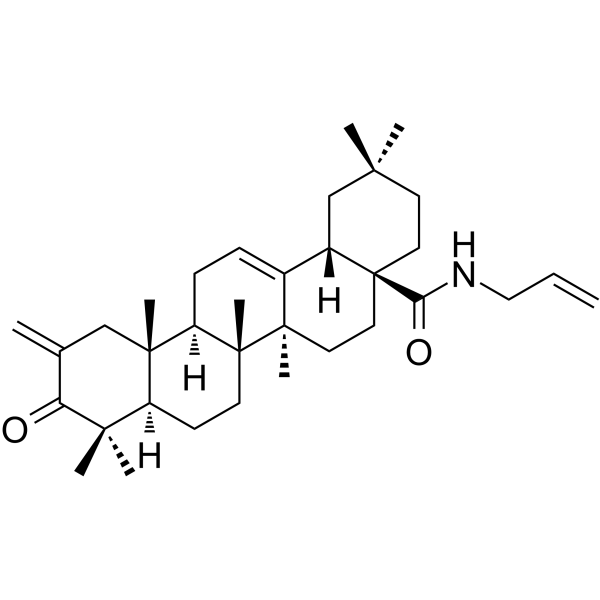
-
- HY-156958
-
-
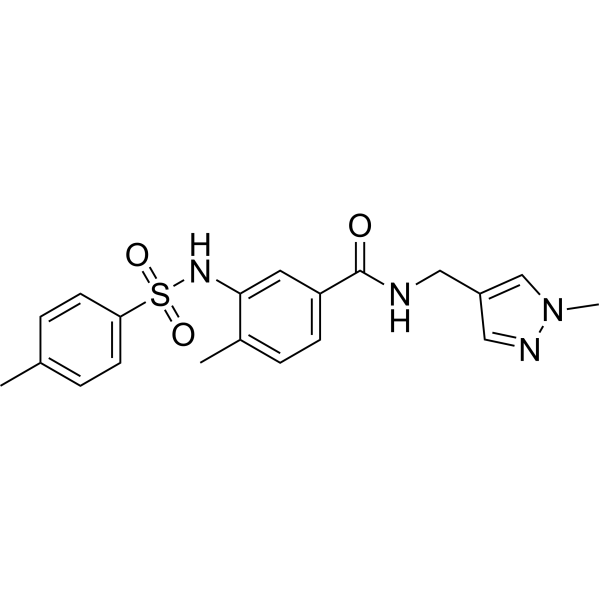
-
- HY-N10394
-
|
|
Others
|
Cancer
|
|
Metachromins X is a sesquiterpene quinone that arrests the cell cycle progression of HeLa/Fucci2 cells at S/G2/M phase .
|
-
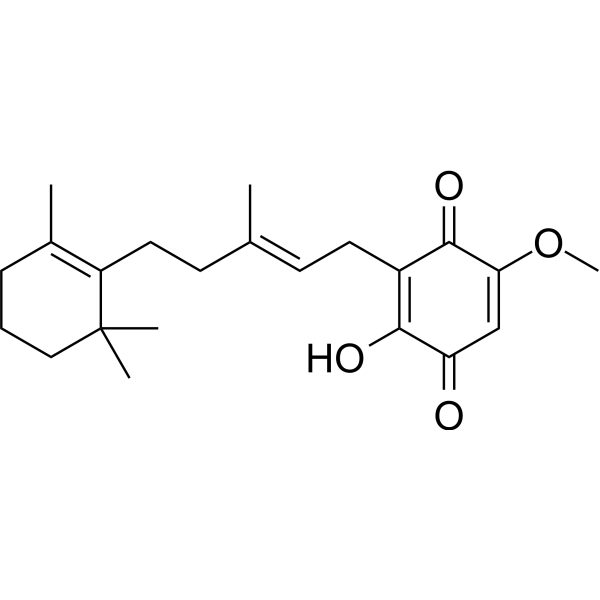
-
- HY-152135
-
|
|
Apoptosis
|
Cancer
|
|
TJ08, a 1,2,5-trisubstituted benzimidazole derivative, efficiently induces G1/S phase arrest and promotes apoptosis in various cancer cells. TJ08 is an anticancer agent .
|
-
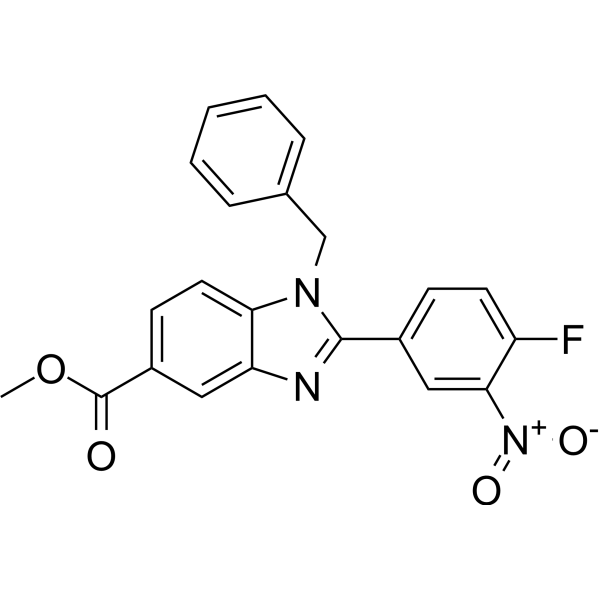
-
- HY-155055
-
|
|
Others
|
Cancer
|
|
Antiproliferative agent-26 (compound 4g) is an antiproliferative agent with much broad range of activity targeting Leukemia, CNS, Melanoma, Renal and Breast (at the concentration of 10 μM). Antiproliferative agent-26 inhibits colony forming and arrests cell cycle at G1 phase/S phase at 5 μM and 25 μM, respectively .
|
-
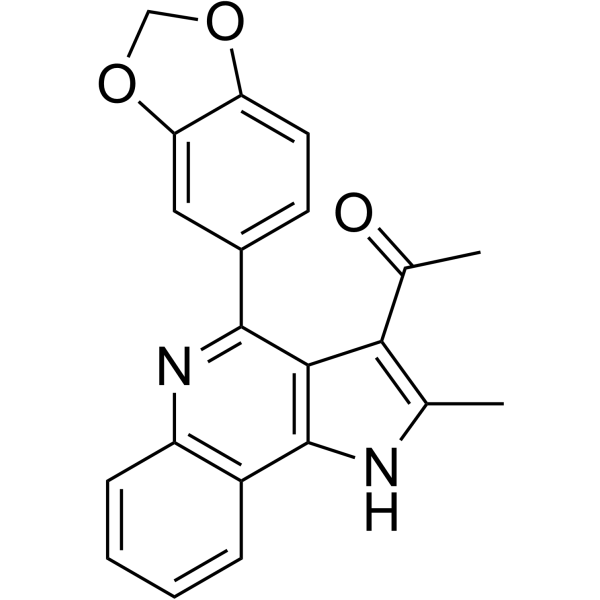
-
- HY-113638
-
|
GS-456332
|
Stearoyl-CoA Desaturase (SCD)
Apoptosis
|
Cancer
|
|
CVT-11127 is a potent SCD inhibitor. CVT-11127 induces apoposis and arrests the cell cycle at the G1/S phase. CVT-11127 has the potential for the research of lung cancer .
|
-
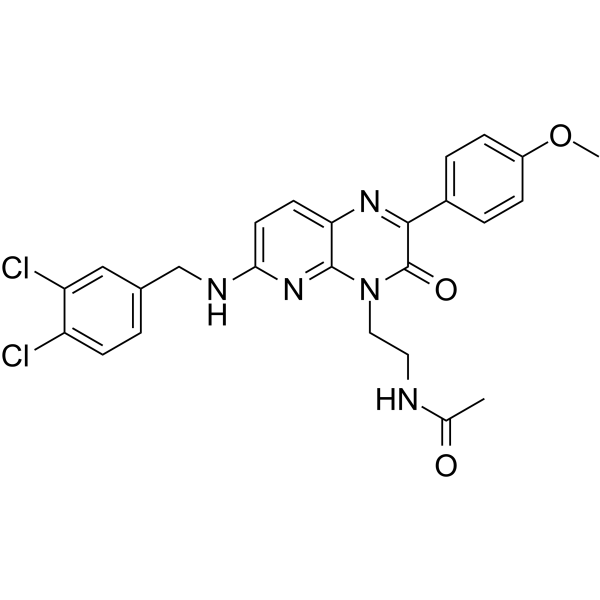
-
- HY-13605A
-
|
Cytosine β-D-arabinofuranoside hydrochloride; Cytosine Arabinoside hydrochloride; Ara-C hydrochloride
|
DNA/RNA Synthesis
Nucleoside Antimetabolite/Analog
HSV
Autophagy
|
Infection
Cancer
|
|
Cytarabine hydrochloride, a nucleoside analog, causes S phase cell cycle arrest and inhibits DNA polymerase. Cytarabine inhibits DNA synthesis with an IC50 of 16 nM. Cytarabine hydrochloride has antiviral effects against HSV.
|
-
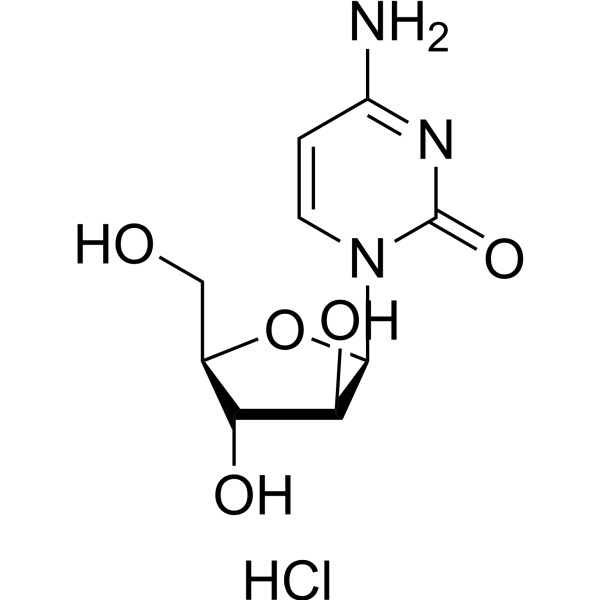
-
- HY-111617
-
|
|
Apoptosis
|
Cancer
|
|
BTR-1 is an active anti-cancer agent, causes S phase arrest, and affects DNA replication in leukemic cells. BTR-1 activates apoptosis and induces cell death .
|
-
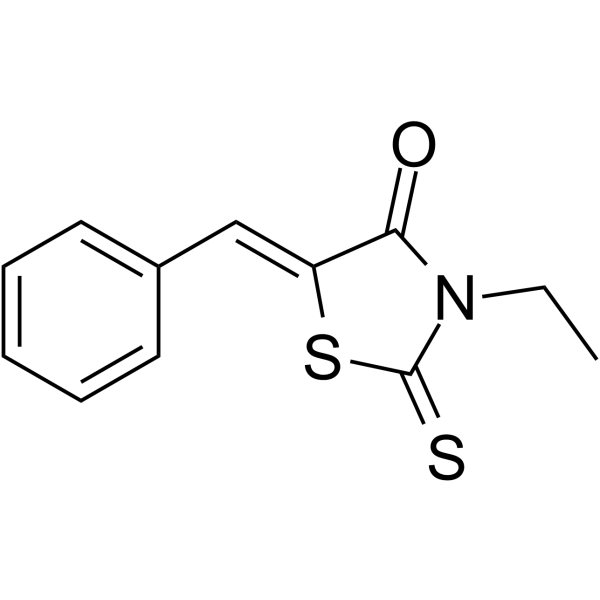
-
- HY-143302
-
|
|
Others
|
Cancer
|
|
Anticancer agent 31 is a 1,3-diphenylurea quinoxaline derivative, and a anticancer agent. Anticancer agent 31 exhibits antitumor acitvity by arresting cell cycle at S phase and inducing apoptosis .
|
-
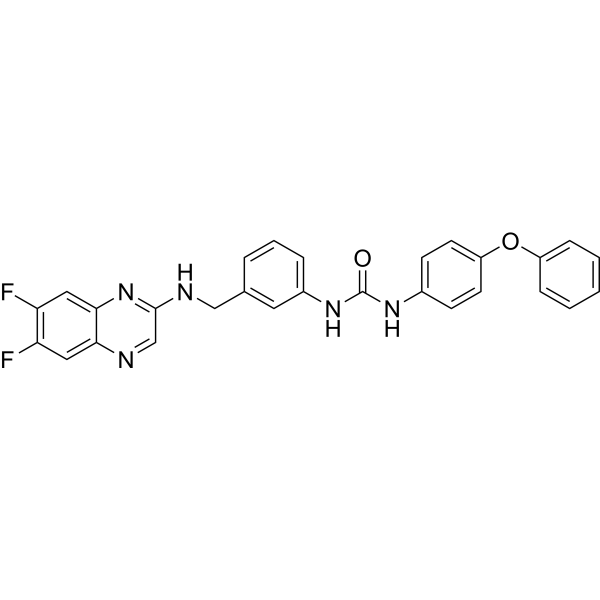
-
- HY-N1428A
-
|
|
|
|
|
Citric acid monohydrate is a natural preservative and food tartness enhancer. Citric acid monohydrate induces apoptosis and cell cycle arrest at G2/M phase and S phase. Citric acid monohydrate cause oxidative damage of the liver by means of the decrease of antioxidative enzyme activities. Citric acid monohydrate causes renal toxicity in mice .
|
-
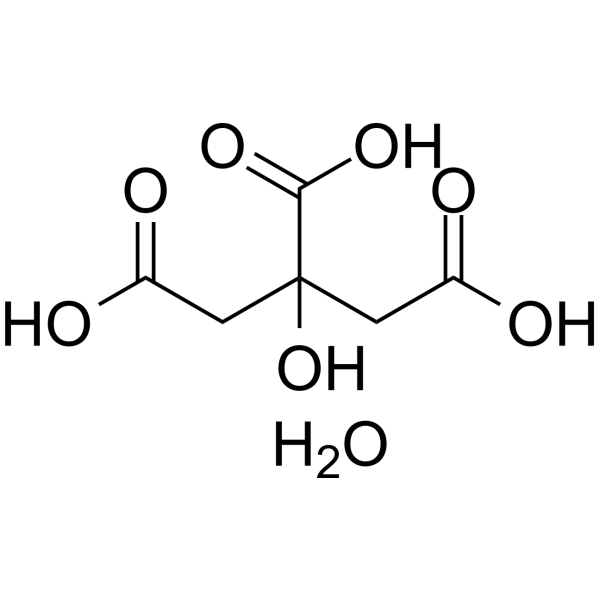
-
- HY-162108
-
|
|
Apoptosis
|
Cancer
|
|
Antitumor agent-128 (compound 1a) is an antitumor agent that elicits cell cycle arrest in both the G2/M and S phases, triggering apoptosis in A549 cells .
|
-
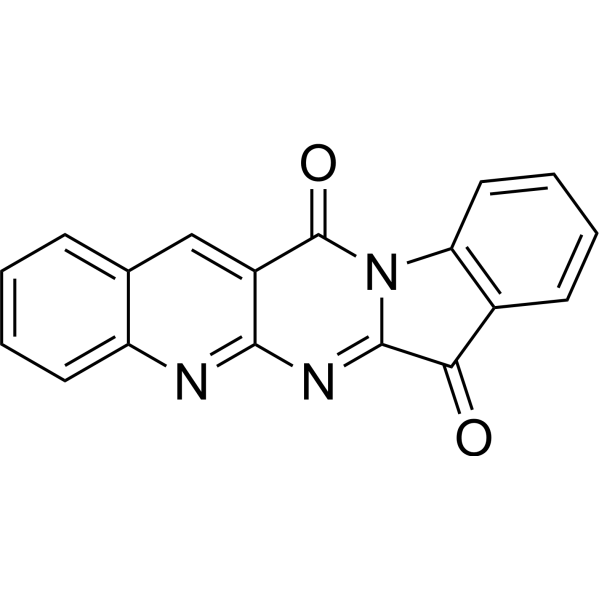
-
- HY-126423
-
|
Isorhamnetin 3-O-glucuronide
|
Others
|
Cancer
|
|
Isorhamnetin 3-glucuronide is a potent anticancer agent. Isorhamnetin 3-glucuronide shows anti-proliferative activity. Isorhamnetin 3-glucuronide induces Apoptosis and cell cycle arrest at S-phase .
|
-
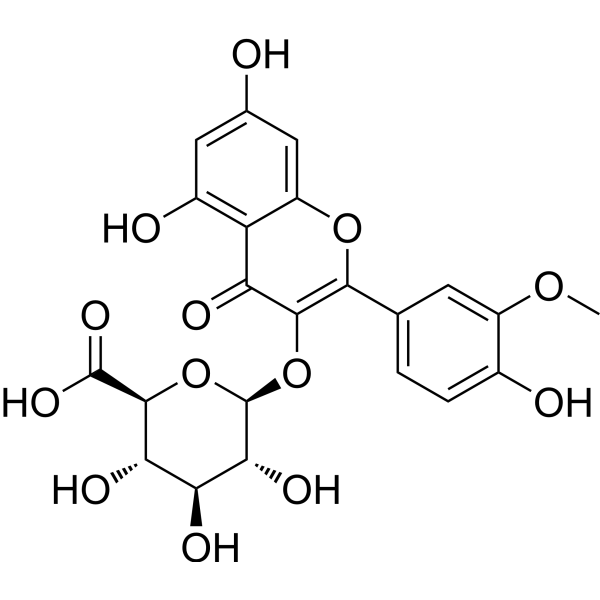
-
- HY-N1428
-
-
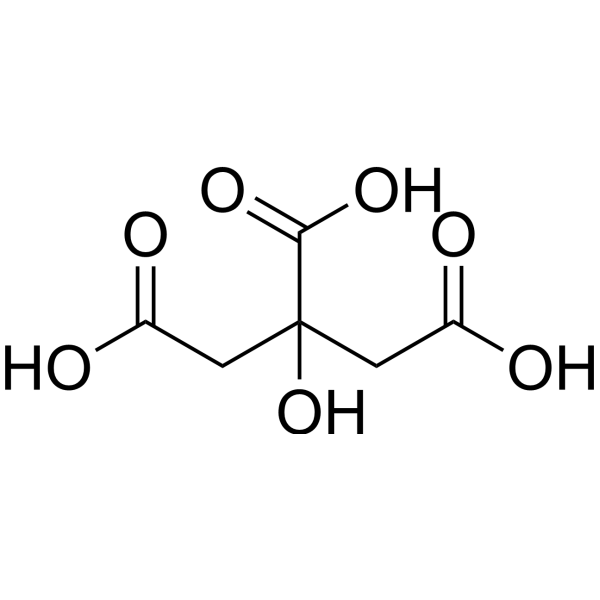
-
- HY-155552
-
|
|
Apoptosis
|
Cancer
|
|
GSPT1 degrader-1 (compound 9q) is a potent degrader of G1 to S phase transition 1 (GSPT1) via ubiquitin-proteasome system. GSPT1 degrader-1 also induces cell G0/G1 phase arrest and apoptosis .
|
-
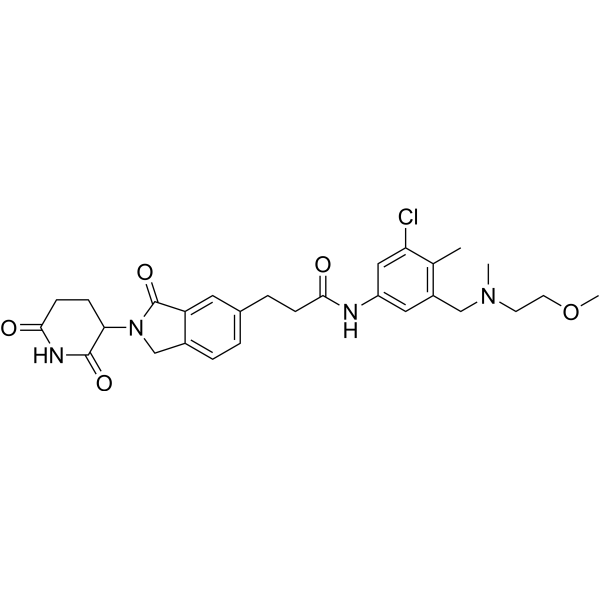
-
- HY-151978
-
|
|
Indoleamine 2,3-Dioxygenase (IDO)
Apoptosis
|
Cancer
|
|
ZC0109 is a dual inhibitor of IDO1 and thioredoxin reductase 1 (TrxR1) with IC50s of 50 nM and 3.0 μM, respectively. ZC0109 induces ROS accumulation and cell cycle arrest at G1/S phase, thus leads to cancer cells apoptosis .
|
-
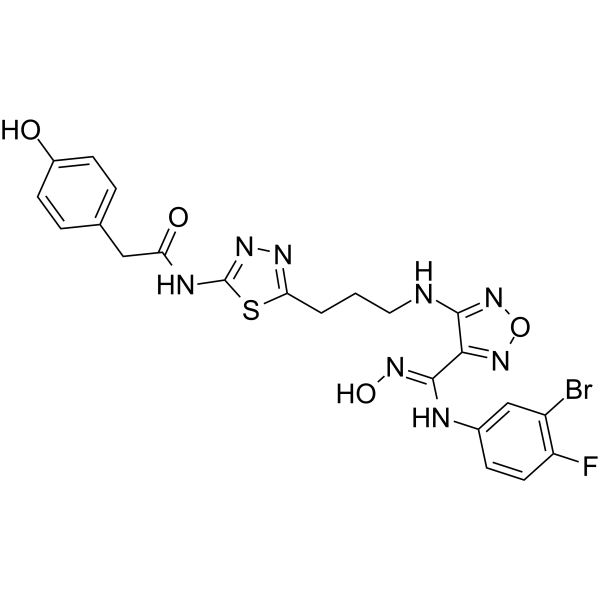
-
- HY-W016099
-
|
MQCA
|
Drug Metabolite
|
Cancer
|
|
3-Methyl-2-quinoxalinecarboxylic acid (MQCA), an important N-oxide reductive metabolite of Quinocetone or Olaquindox, potently inhibits the growth of Chang liver cells through S phase arrest of the cell cycle .
|
-
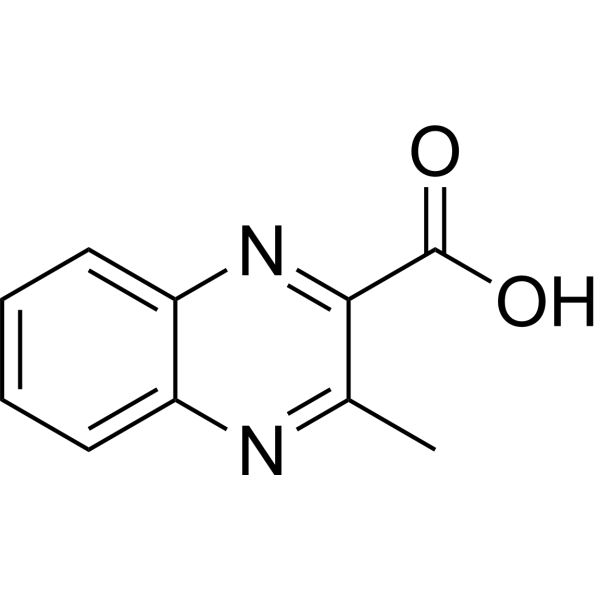
-
- HY-13768C
-
|
SKF 104864A hydrochloride hydrate; NSC 609669 hydrochloride hydrate
|
Topoisomerase
Apoptosis
Autophagy
|
Cancer
|
|
Topotecan hydrochloride hydrate is an orally active and potent Topoisomerase I inhibitor. Topotecan hydrochloride hydrate induces cell cycle arrest in G0/G1 and S phases and promotes apoptosis. Topotecan hydrochloride hydrate shows anticancer activity .
|
-
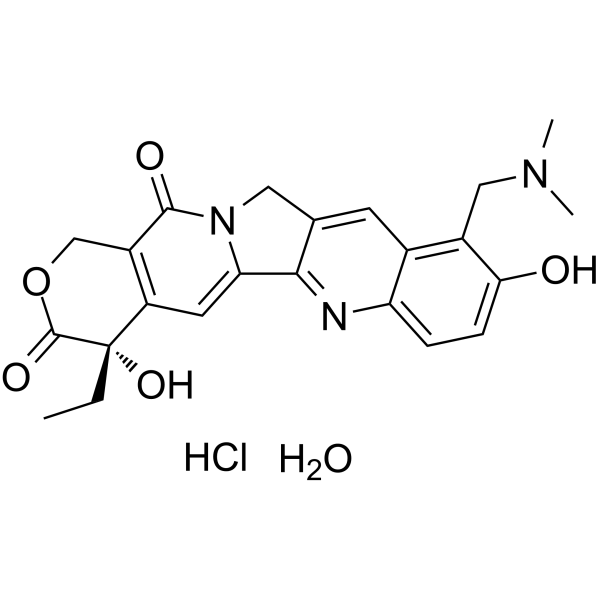
-
- HY-B2201
-
|
Sodium citrate; Trisodium citrate anhydrous
|
Apoptosis
Endogenous Metabolite
|
Metabolic Disease
|
|
Citric acid trisodium is a natural preservative and food tartness enhancer. Citric acid trisodium induces apoptosis and cell cycle arrest at G2/M phase and S phase. Citric acid trisodium cause oxidative damage of the liver by means of the decrease of antioxidative enzyme activities. Citric acid trisodium causes renal toxicity in mice .
|
-
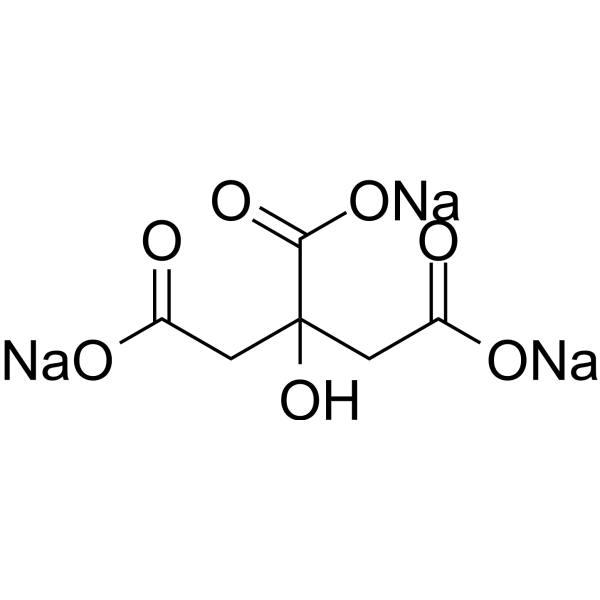
-
- HY-13605
-
-
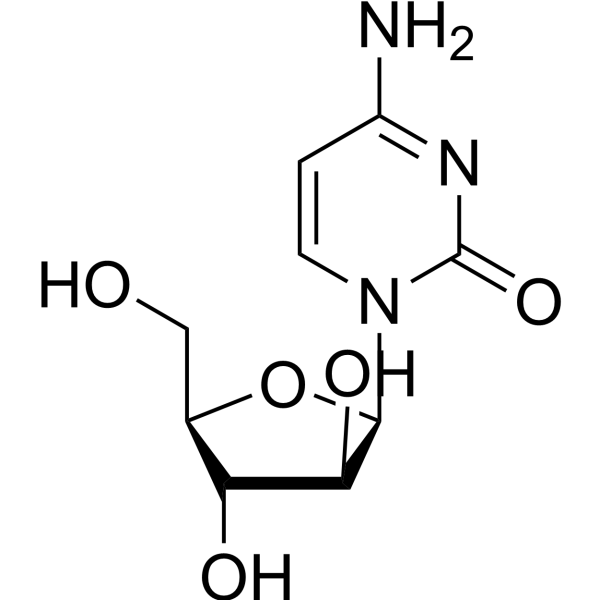
-
- HY-118672
-
|
|
HDAC
MMP
HIF/HIF Prolyl-Hydroxylase
|
Cancer
|
|
HNHA is a potent histone deacetylase (HDAC) inhibitor. HNHA arrests the cell cycle at the G1/S phase via p21 induction. HNHA inhibits tumor growth and tumor neovascularization. HNHA may be a potent anti-cancer agent against breast cancer .
|
-
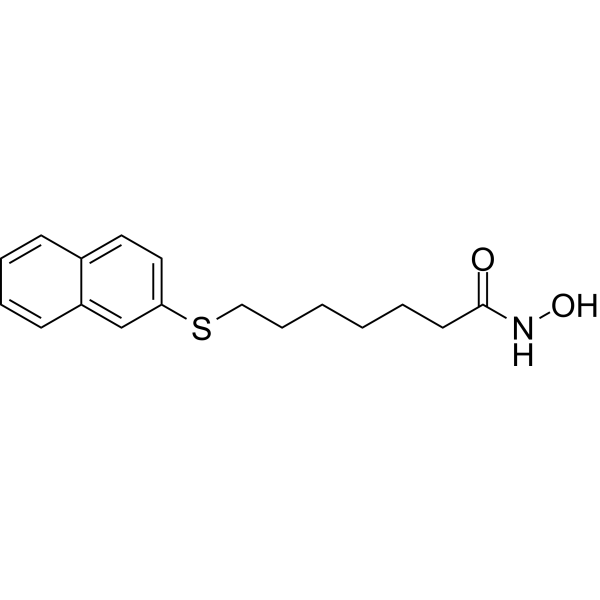
-
- HY-150655
-
|
|
HSP
|
Cancer
|
|
Hsp90-IN-15 is an Hsp90 inhibitor with anticancer activity. Hsp90-IN-15 induces cell apoptosis, arrests the cell cycle at S phase and decreases the expression level of Hsp90 in Hela cell .
|
-
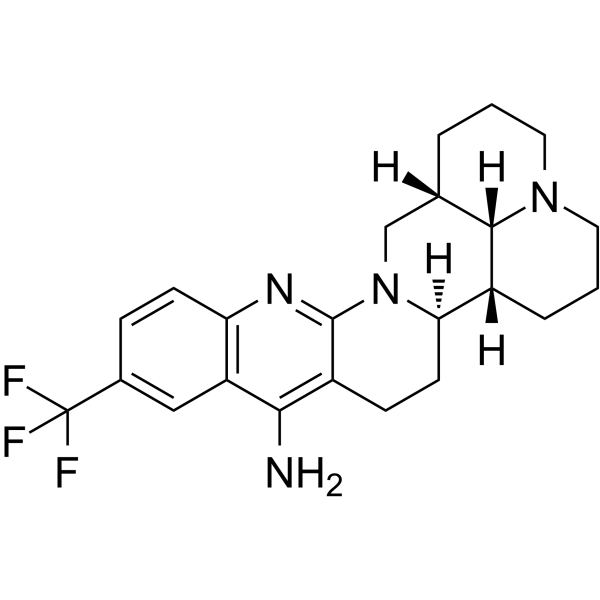
-
- HY-125612
-
|
5'-Hydroxymorusin
|
Apoptosis
|
Cancer
|
|
Artonin E (5'-Hydroxymorusin) is a known prenylated flavonoid that induces apoptosis and arrests the cell cycle in S phase. Artonin E can induce anti-proliferative effects through mitochondrial pathway dysregulation and can be used in cancer research .
|
-
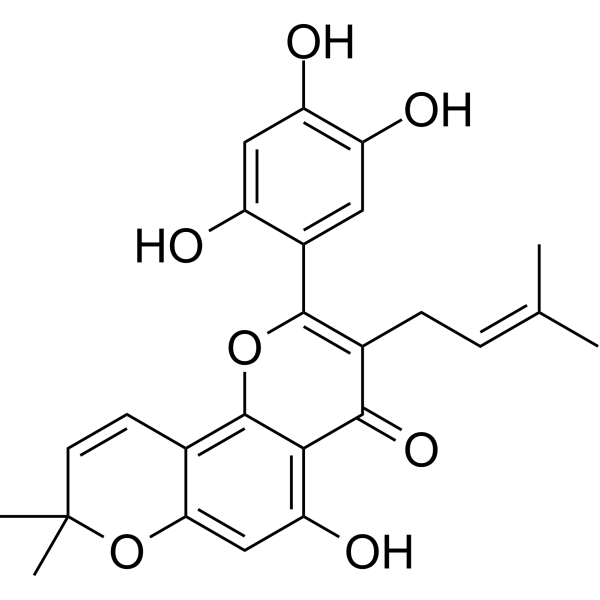
-
- HY-161067
-
|
|
EGFR
Apoptosis
|
Cancer
|
|
EGFR-IN-96 (compound 7a) is a thieno[2,3-d]pyrimidine EGFR inhibitor that can induce apoptosis. EGFR-IN-96 arrests the growth of HepG2 cells in the S phase and G2/M phase, and inhibits the growth of cancer cells bearing EGFR wild-type and EGFR T790M .
|
-
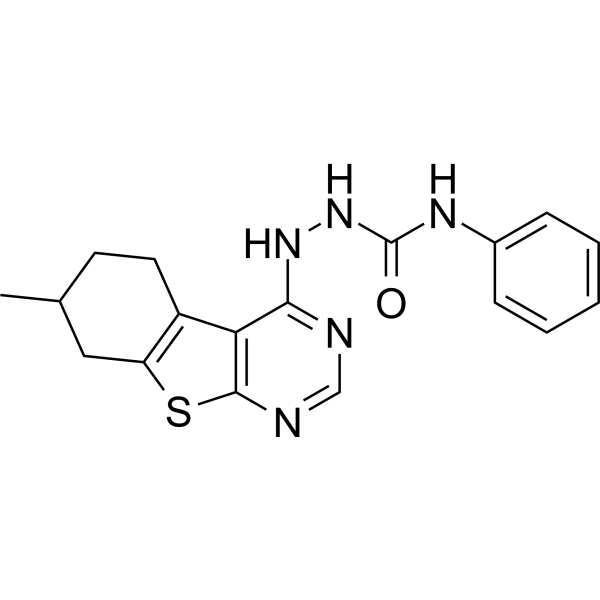
-
- HY-13768
-
|
SKF 104864A; NSC 609669
|
Topoisomerase
Autophagy
Apoptosis
|
Cancer
|
|
Topotecan (SKF 104864A; NSC 609669) is an orally active and potent Topoisomerase I inhibitor. Topotecan induces cell cycle arrest in G0/G1 and S phases and promotes apoptosis. Topotecan shows anticancer activity .
|
-
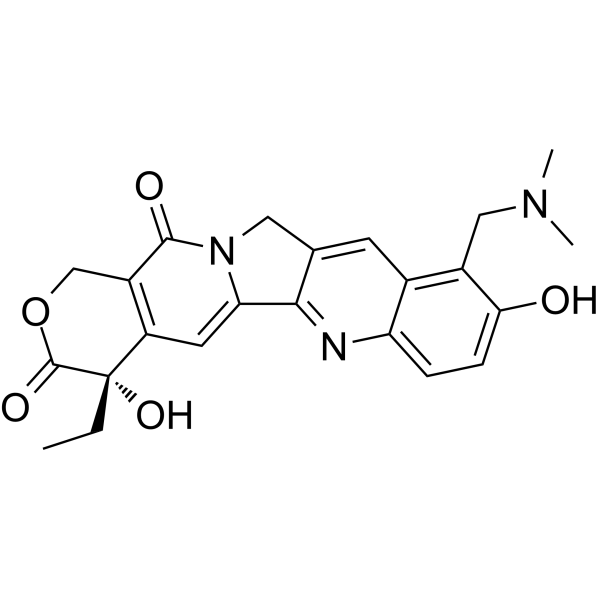
-
- HY-156298
-
|
|
PARP
Apoptosis
|
Cancer
|
|
PARP1-IN-16 (compound 12a) is a potent PARP1 inhibitor, with an IC50 of 1.89 nM. PARP1-IN-16 can arrest the cell cycle in S phase and induce apoptosis in HCT-116 cells .
|
-
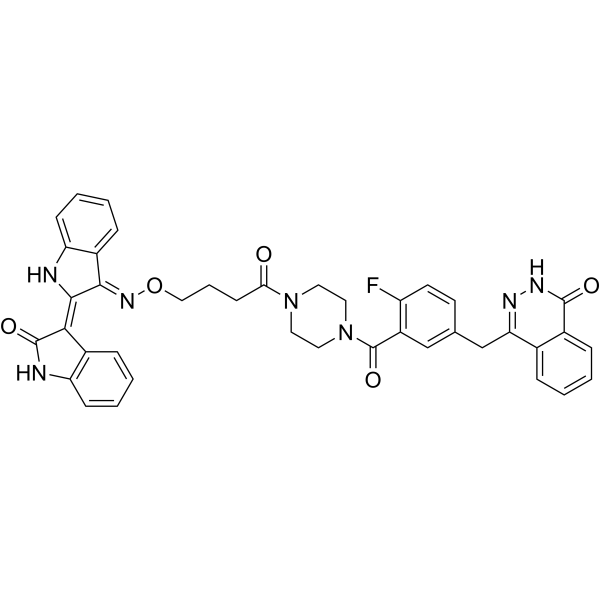
-
- HY-N1428S4
-
|
|
Isotope-Labeled Compounds
Endogenous Metabolite
Apoptosis
Antibiotic
|
Cancer
|
|
Citric acid- 18O is 18O-labeled Citric acid (HY-N1428) Citric acid is a natural preservative and food tartness enhancer. Citric acid induces apoptosis and cell cycle arrest at G2/M phase and S phase in HaCaT cells. Citric acid cause oxidative damage of the liver by means of the decrease of antioxidative enzyme activities. Citric acid causes renal toxicity in mice.
|
-
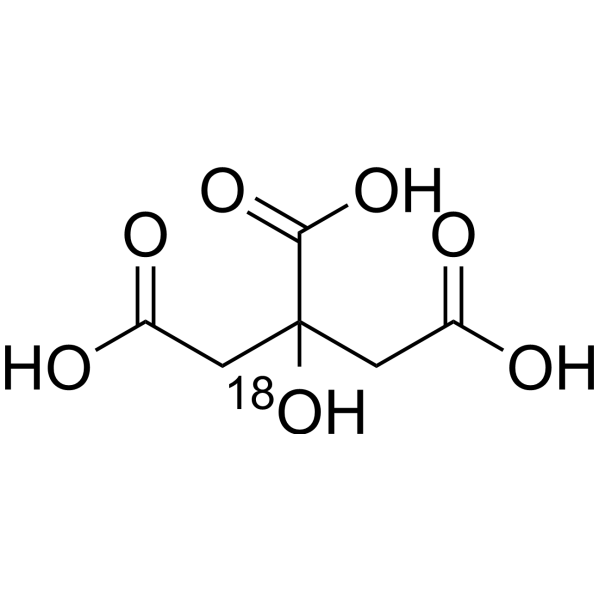
-
- HY-149849
-
|
|
Thymidylate Synthase
|
Cancer
|
|
TS-IN-2 (compound 17) is a thymidylate synthase (TS) inhibitor with an IC50 of 0.81 μM. TS-IN-2 induces cancer cell apoptosis and cell cycle arrest in S phase, and also inhibit DNA synthesis, resulting in DNA damage .
|
-
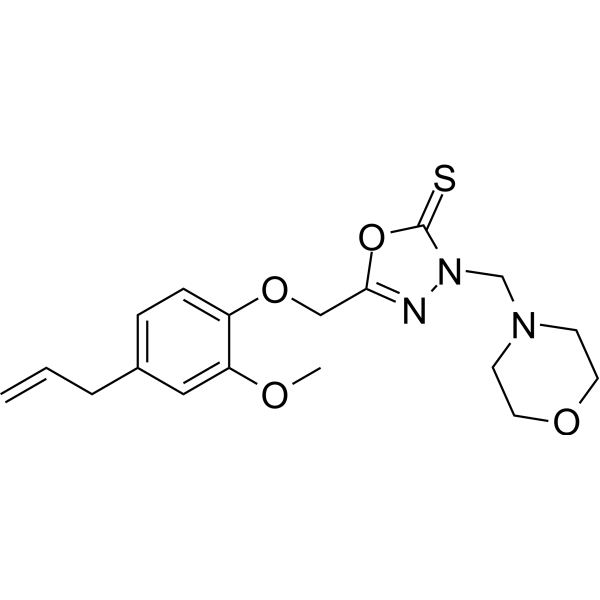
-
- HY-155339
-
|
|
Others
|
Cancer
|
|
Anticancer agent 168 (compound d16) is a inhibitor of DNA2. Anticancer agent 168 induces apoptosis and cell-cycle arrest mainly at S-phase, and exhibits anticancer activities and overcomes chemotherapy resistance in mutp53-bearing cancers .
|
-
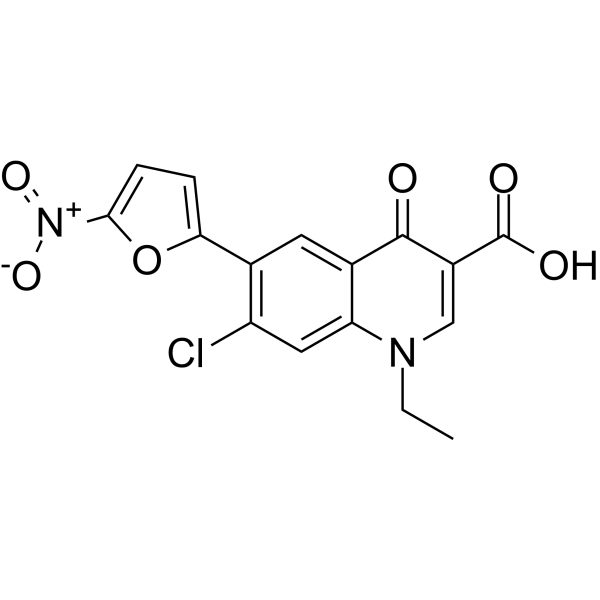
-
- HY-13605S
-
-
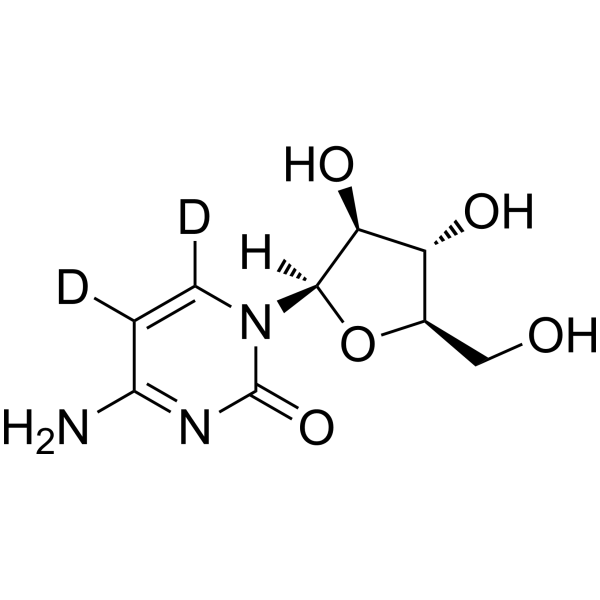
-
- HY-155609
-
|
|
VEGFR
|
Cancer
|
|
VEGFR-2-IN-31 (compound 3i) is a potent VEGFR-2 inhibitor (IC50=8.93 nM), and an anti-prostate cancer agent. VEGFR-2-IN-31 arrests cell cycle at the S-phase and induces apoptosis.
|
-
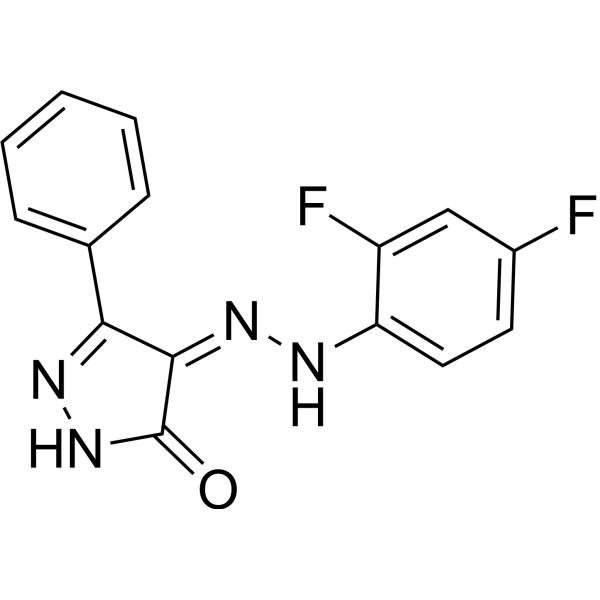
-
- HY-N1428S6
-
|
|
Isotope-Labeled Compounds
Endogenous Metabolite
Apoptosis
Antibiotic
|
Cancer
|
|
Citric acid-d4-1 is deuterated labeled Citric acid (HY-N1428) Citric acid is a natural preservative and food tartness enhancer. Citric acid induces apoptosis and cell cycle arrest at G2/M phase and S phase in HaCaT cells. Citric acid cause oxidative damage of the liver by means of the decrease of antioxidative enzyme activities. Citric acid causes renal toxicity in mice.
|
-
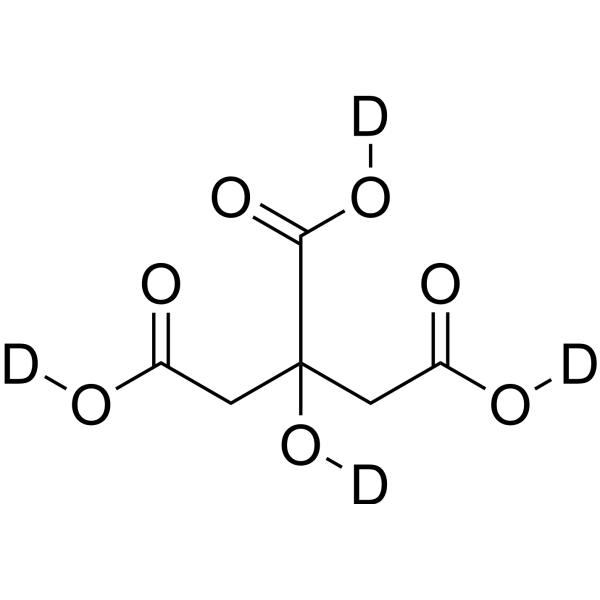
-
- HY-108474
-
|
AG 337; Thymitaq
|
Thymidylate Synthase
|
Cancer
|
|
Nolatrexed dihydrochloride (AG 337) is a non-competitive lipophilic inhibitor of thymidylate synthase, interacts at the folate cofactor binding site of the enzyme, with a Ki of 11 nM for human thymidylate synthase . Nolatrexed dihydrochloride (AG 337) induces cell cycle arrest in S phase of cancer cells. Anti-cancer activity .
|
-
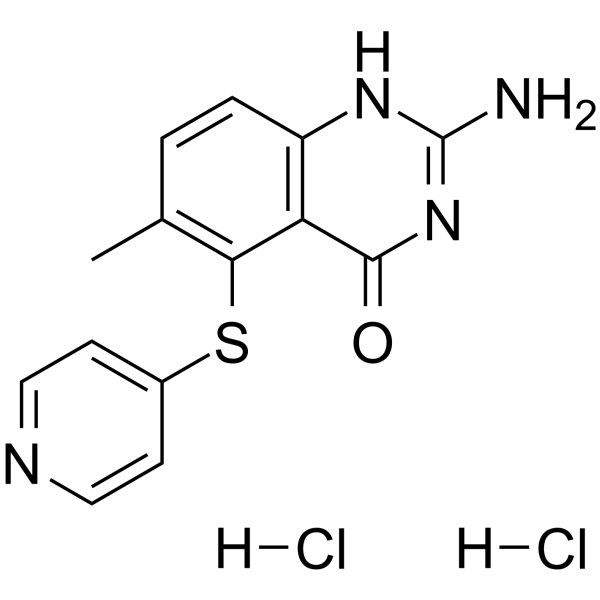
-
- HY-N1196
-
|
|
|
|
|
Suberosin, isolated from Plumbago zeylanica, exhibits anti-inflammatory and anticoagulant activity. Suberosin suppresses PHA-induced PBMC proliferation and arrested cell cycle progression from the G1 transition to the S phase through the modulation of the transcription factors NF-AT and NF-κB .
|
-
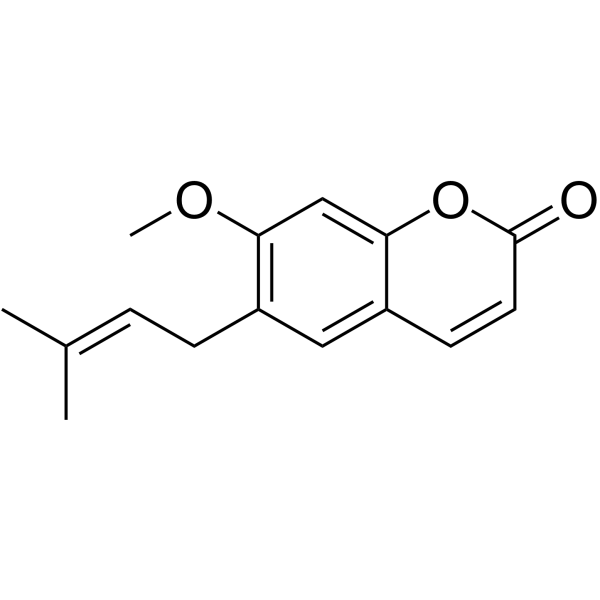
-
- HY-N1428S3
-
|
|
Apoptosis
Endogenous Metabolite
Antibiotic
|
|
|
Citric acid- 13C3 is the 13C labeled Citric acid[1]. Citric acid is a natural preservative and food tartness enhancer. Citric acid induces apoptosis and cell cycle arrest at G2/M phase and S phase in HaCaT cells. Citric acid cause oxidative damage of the liver by means of the decrease of antioxidative enzyme activities. Citric acid causes renal toxicity in mice[2][3][4].
|
-
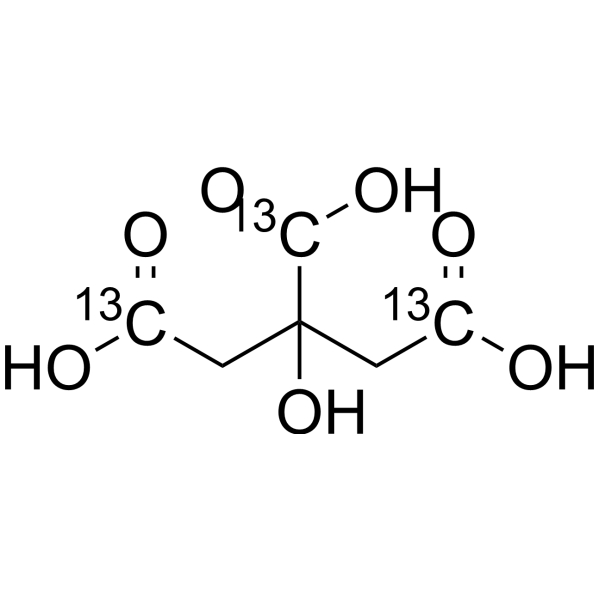
-
- HY-B1508
-
|
Acetomenaphthone
|
Endogenous Metabolite
Apoptosis
|
Cardiovascular Disease
Cancer
|
|
Vitamin K4 is a chemically synthesized Vitamin K which plays an important role in the normal blood coagulation system. Vitamin K4 arrests the cells in S phase and induces apoptosis. Vitamin K4 can be used for the research of cancer, such as prostate cancer and osteosarcoma .
|
-
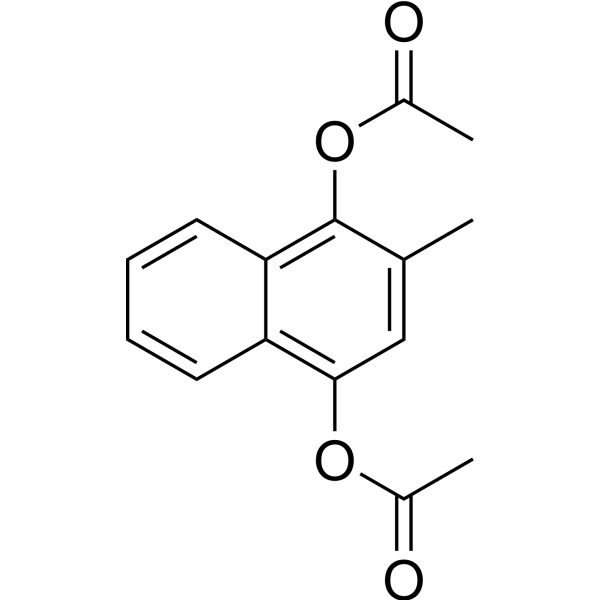
-
- HY-146407
-
|
|
Apoptosis
|
Cancer
|
|
Anticancer agent 53 is a potent anticancer agent. Anticancer agent 53 shows in vitro cytotoxicity. Anticancer agent 53 induces apoptosis and cell cycle arrest in S/G2/M phases. Anticancer agent 53 shows antitumor activity with no apparent toxicity .
|
-
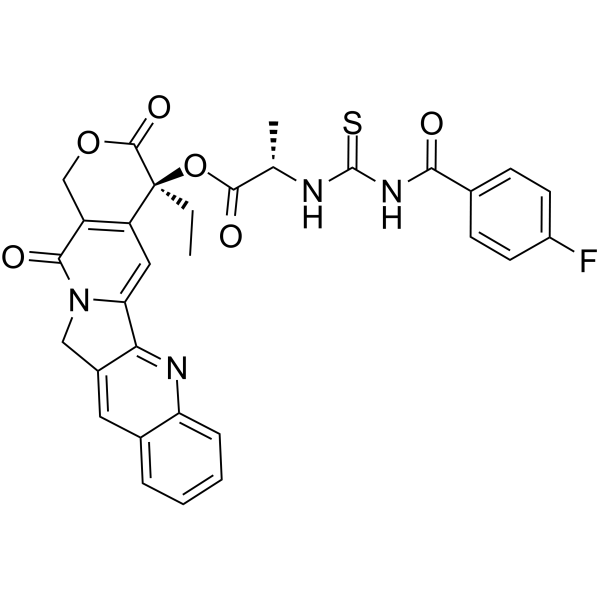
-
- HY-W278582
-
|
|
Topoisomerase
Apoptosis
|
Cancer
|
|
Topoisomerase II inhibitor 14 (compound 2f) is a potent inhibtor of Topoisomerase II, with anticancer activity. Topoisomerase II inhibitor 14 induces apoptosis, and arrests cell cycle at S phase. Topoisomerase II inhibitor 14 exhibits antioxidant effect and decreases the level of GSH, MDA, and NO .
|
-
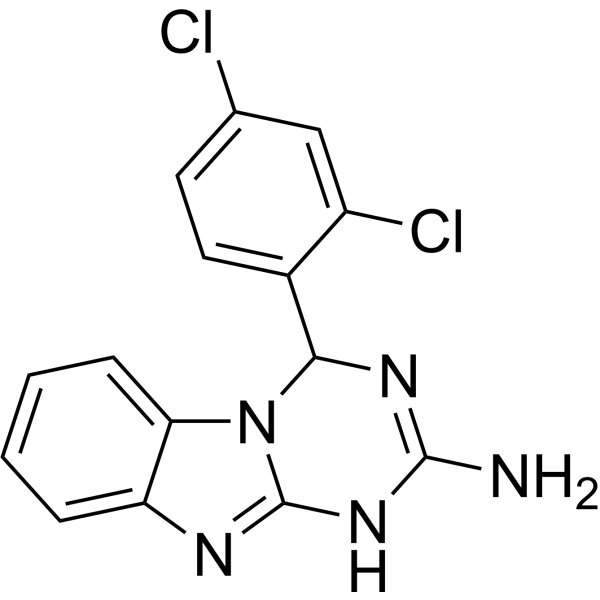
-
- HY-161146
-
|
|
EGFR
Apoptosis
|
Cancer
|
|
EGFR-IN-100 (compound 3f) is a EGFR inhibitor with IC50 range of 0.137-0.507 μM. EGFR-IN-100 has antiproliferative activity and induces the apoptosis pathway. EGFR-IN-100 arrests the MCF-7 cell cycle at the S phase .
|
-
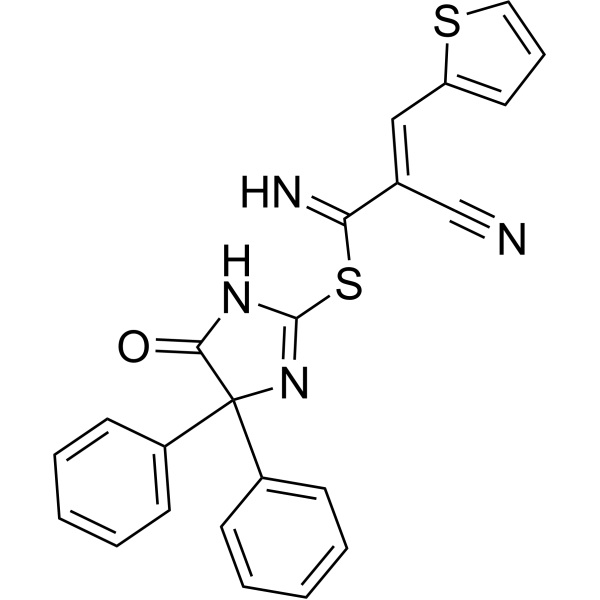
-
- HY-151969
-
|
|
VEGFR
|
Cancer
|
|
VEGFR-2-IN-30 is a VEGFR-2 inhibitor (IC50: 66 nM). VEGFR-2-IN-30 also inhibits PDGFR, EGFR and FGFR1 with IC50s of 180, 98, 82 nM respectively. VEGFR-2-IN-30 arrests cancer cell at S-phase and induces early and late apoptosis .
|
-
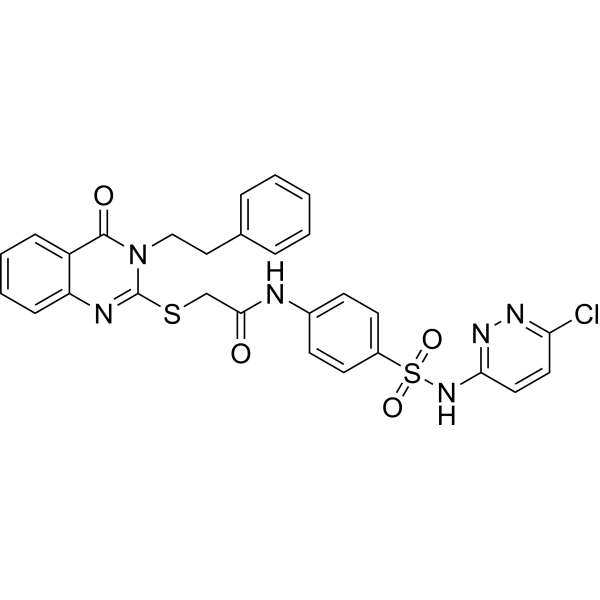
-
- HY-145670
-
|
|
Akt
MDM-2/p53
|
Cancer
|
|
cis,trans-Germacrone is a isomer of Germacrone (HY-N0440). Germacrone exhibits a wide range of antitumor, antioxidant and anti-inflammatory effects. Germacrone inhibits lung cancer cell proliferation and alters the Akt/MDM2/p53. Germacrone also arrests cell cycle at G1/S phase .
|
-
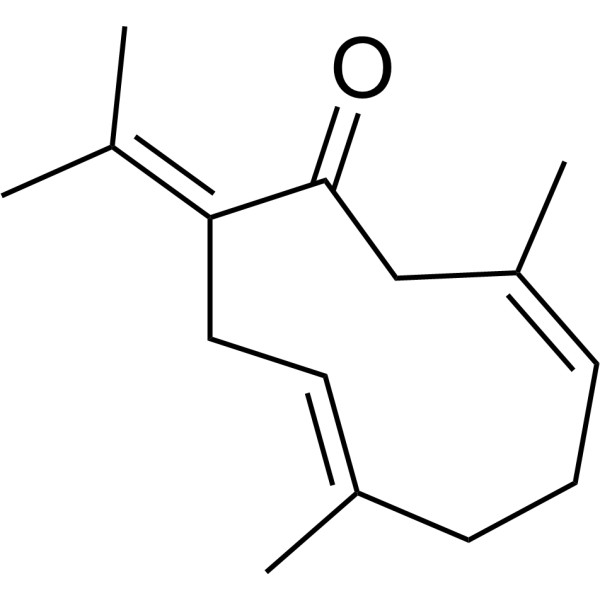
-
- HY-146980
-
|
|
Apoptosis
GLUT
|
Cancer
|
|
GLUT4-IN-2 is a potent and selective GLUT4 inhibitor with IC50s of 11.4 µM and 6.8 µM for GLUT1 and GLUT4, respectively. GLUT4-IN-2 induces cell apoptosis and cell cycle arrest at G0/G1phase. GLUT4-IN-2 shows potent antitumor activity .
|
-
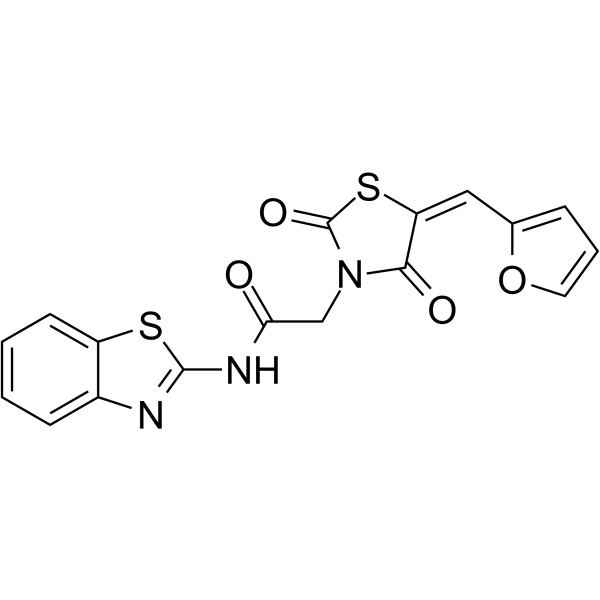
-
- HY-145963
-
|
|
GLUT
|
Cancer
|
|
DRB18 is a potent pan-class GLUT inhibitor. DRB18 alters energy-related metabolism in A549 cells by changing the abundance of metabolites in glucose-related pathways. DRB18 can eventually lead to G1/S phase arrest and increase oxidative stress and necrotic cell death. DRB18 has anti-tumor activity .
|
-
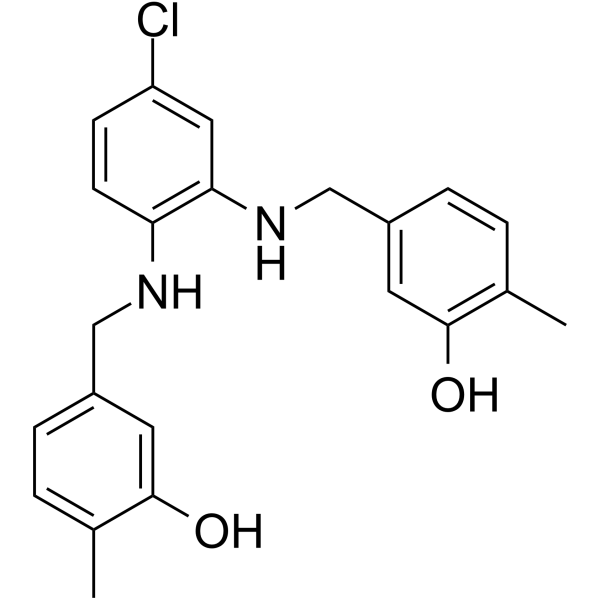
-
- HY-N0273S
-
|
Brassin lactone-d5
|
Isotope-Labeled Compounds
Apoptosis
|
Cancer
|
|
Brassinolide-d5 (Brassin lactone-d5) is the deuterated labeled Brassinolide (HY-N0273). Citric acid is a natural preservative and food tartness enhancer. Citric acid induces apoptosis and cell cycle arrest at G2/M phase and S phase in HaCaT cells. Citric acid cause oxidative damage of the liver by means of the decrease of antioxidative enzyme activities. Citric acid causes renal toxicity in mice .
|
-
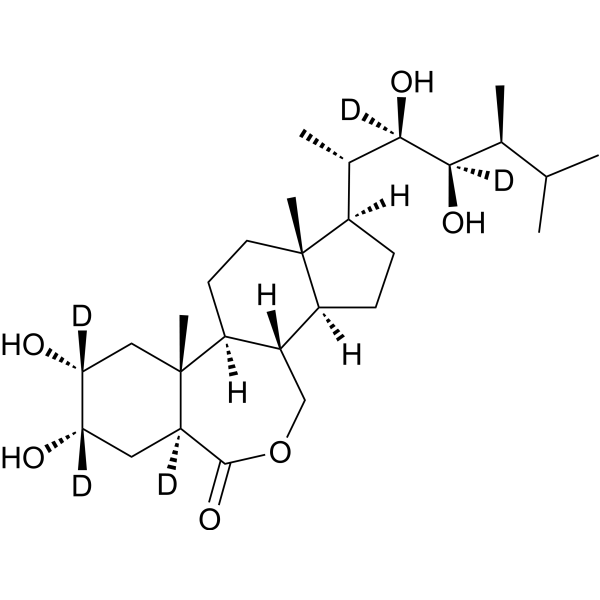
-
- HY-N0636
-
|
|
Apoptosis
|
Cancer
|
|
Eriocitrin is a flavonoid isolated from lemons that is a powerful antioxidant. Eriocitrin inhibits the proliferation of liver cancer cells by arresting the cell cycle in the S phase by upregulating p53, cyclin A, cyclin D3 and CDK6. Eriocitrin triggers apoptosis by activating intrinsic signaling pathways involving mitochondria .
|
-
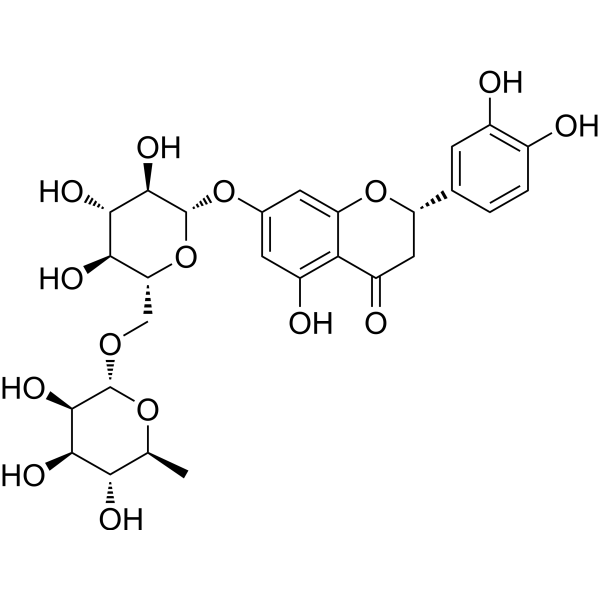
-
- HY-143246
-
|
|
EGFR
Apoptosis
|
Cancer
|
|
EGFR kinase inhibitor 1 is a potent EGFR inhibitor with IC50s of 37, 1.7, >300 nM for WT, l885R/T790M, L858R/T790M/C797S, respectively. EGFR kinase inhibitor 1 induces apoptosis and cell cycle arrest at G0/G1-phase. EGFR kinase inhibitor 1 inhibits the cell motility. EGFR kinase inhibitor 1 shows antiproliferative and anti-tumor activity .
|
-
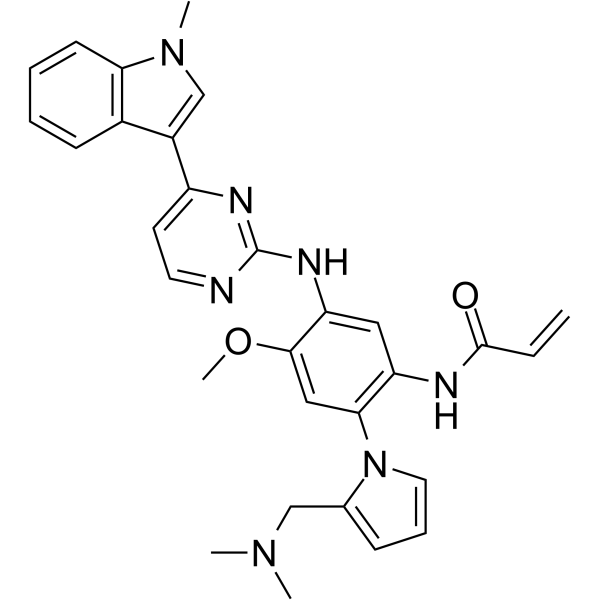
-
- HY-15228
-
RX-3117
1 Publications Verification
TV-1360; Fluorocyclopentenylcytosine
|
Nucleoside Antimetabolite/Analog
Apoptosis
|
Cancer
|
|
RX-3117 (TV-1360) is a potent and orally active anticancer and antimetaboliteagent. RX-3117 inhibits DNA methyltransferase 1 (DNMT1). RX-3117 shows antiproliferative and anti-tumour activity. RX-3117 induces cell cycle arrest at S phase and apoptosis .
|
-
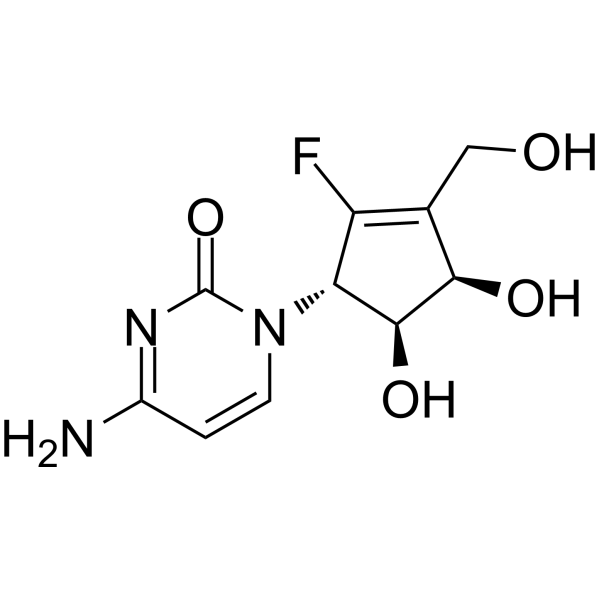
-
- HY-145438
-
|
|
Others
|
Cancer
|
|
Antitumor agent-38 is a potent antitumor agents. Antitumor agent-38 shows antiproliferative activity for cancer cells. Antitumor agent-38 induces cell cycle arrest at the late S and G2/M phase without interfering with microtubule formation or cell morphology[1].
|
-
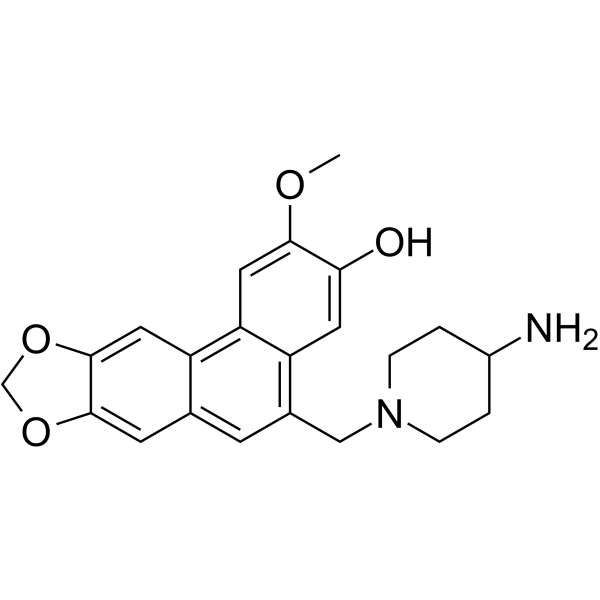
-
- HY-146038
-
|
|
Apoptosis
ROS Kinase
MDM-2/p53
Bcl-2 Family
|
Cancer
|
|
Antitumor agent-55 (compound 5q) is a potent antitumor agent. Antitumor agent-55 effectively inhibits PC3, with an IC50 of 0.91 μM. Antitumor agent-55 effectively inhibits the colony formation, suppresses the cell migration in PC3. Antitumor agent-55 induces G1/S phase arrest and apoptosis in PC3 .
|
-
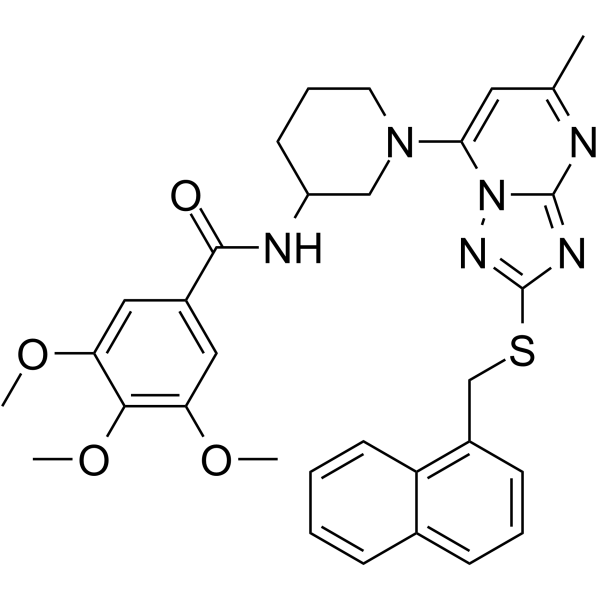
-
- HY-P1032S1
-
|
|
Isotope-Labeled Compounds
Endogenous Metabolite
|
Others
|
|
Angiotensin I- 13C5, 15N (human, mouse, rat) is the 13C and 15N labeled Angiotensin I (human, mouse, rat) (HY-P1032). Citric acid is a natural preservative and food tartness enhancer. Citric acid induces apoptosis and cell cycle arrest at G2/M phase and S phase in HaCaT cells. Citric acid cause oxidative damage of the liver by means of the decrease of antioxidative enzyme activities. Citric acid causes renal toxicity in mice .
|
-
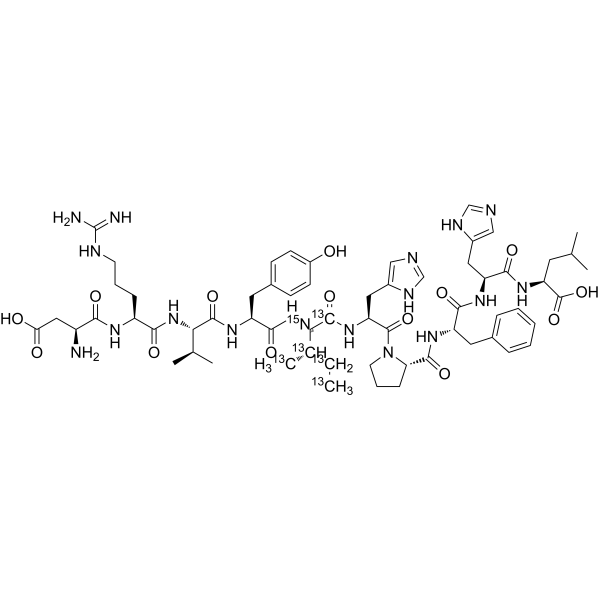
- HY-147698
-
|
|
CDK
Topoisomerase
Apoptosis
|
Cancer
|
|
ZLHQ-5f is a dual CDK2 and Topo I inhibitor with an IC50 of 0.145 μM against CDK2/CycA2. ZLHQ-5f arrests the cell cycle in S-phase, triggers apoptosis in HCT116 cells, and has a good safety profile .
|
-
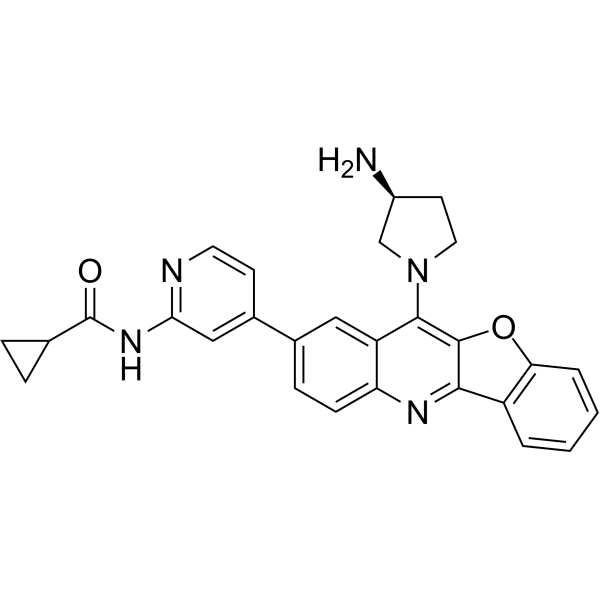
- HY-13721
-
|
Idronoxil; Dehydroequol; Haginin E
|
Caspase
Apoptosis
Topoisomerase
|
Cancer
|
|
Phenoxodiol (Idronoxil), a synthetic analog of Genestein, activates the mitochondrial caspase system, inhibits XIAP (an apoptosis inhibitor), and sensitizes the cancer cells to Fas-mediated apoptosis. Phenoxodiol also inhibits DNA topoisomerase II by stabilizing the cleavable complex. Phenoxodiol induces cell cycle arrest in the G1/S phase of the cell cycle and upregulates p21 WAF1 via a p53 independent manner .
|
-
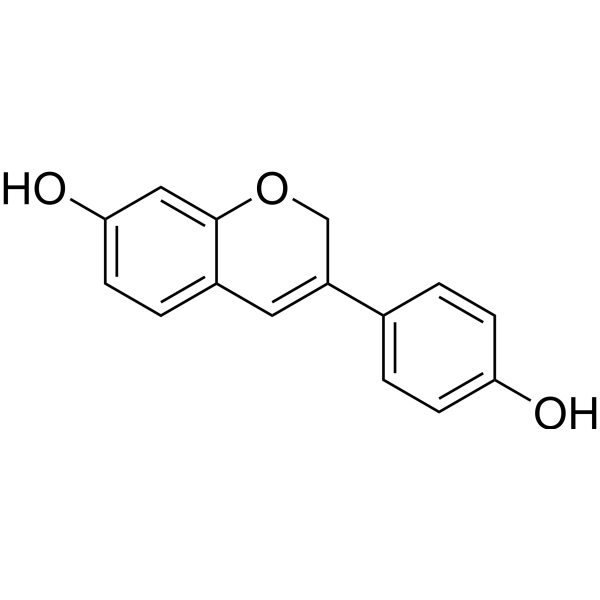
- HY-149889
-
|
|
Apoptosis
EGFR
|
Cancer
|
|
EGFR-IN-78 (compound A5),a 2-aminopyrimidine derivative,is a reversible inhibitor of EGFR C797S-TK,and also an inducer of apoptosis. EGFR-IN-78 shows anti-proliferative activity,inhibits EGFR phosphorylation and arrests cell cycle at G2/M phase .
|
-
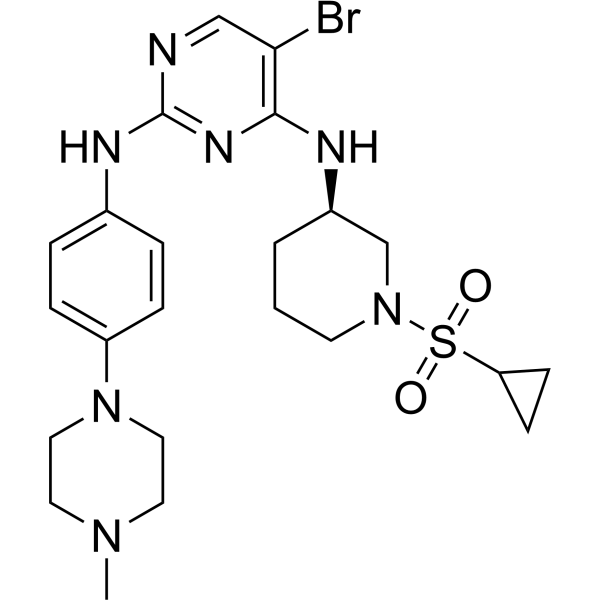
- HY-155441
-
|
|
CDK
|
Cancer
|
CDK2-IN-20 (compound 3b) is an inhibitor of CDK2. CDK2-IN-20 has cytotoxicity on tumor cells presenting an IC50 range of 5.52-17.09 µM. CDK2-IN-20 arrests the MCF-7 cell cycle at the S phase and induces apoptosis .
|
-
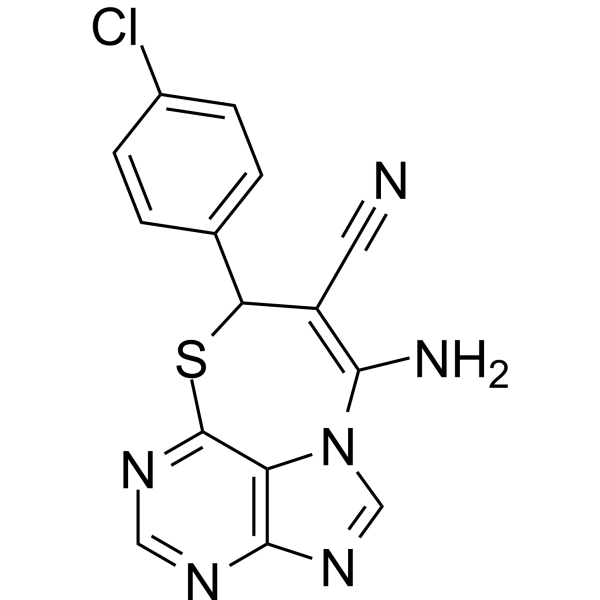
- HY-157324
-
|
|
EGFR
Apoptosis
VEGFR
|
Cancer
|
|
EGFR-IN-94 (compound 5a) is a EGFR inhibitor with IC50 of 0.086?μM, and also has IC50 of 0.107μM and 2.52 μM for VEGFR-2 and Topo II, respectively. EGFR-IN-94 induces cell apoptosis and arrests cell cycle at the S phase in HepG-2 cells .
|
-
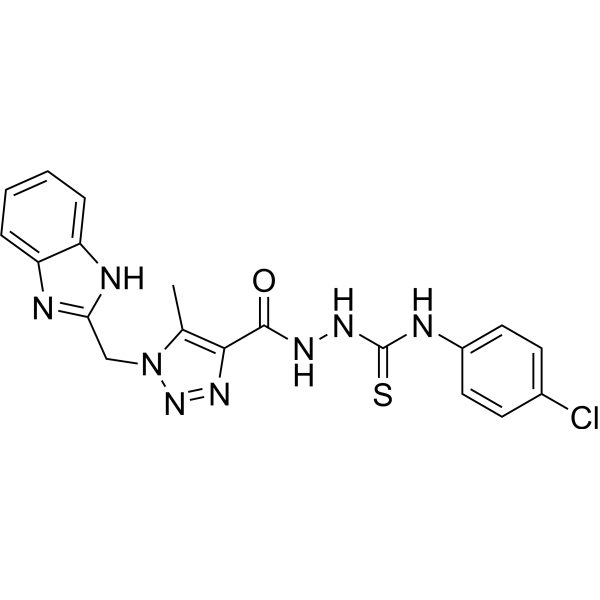
- HY-119151
-
|
|
Apoptosis
HPV
|
Infection
|
|
GS-9191 is the prodrug of the nucleotide analog PMEG. GS-9191 is a topical agent to permeate skin and be metabolized to the active nucleoside triphosphate analog in the epithelial layer. GS-9191 inhibits DNA synthesis, arrests cell in S phase, and induces cell apoptosis. GS-9191 can be used for research of human papillomaviruses (HPV) infection .
|
-

- HY-155781
-
|
|
COX
|
Inflammation/Immunology
|
|
Anti-inflammatory agent 53 (compound 7c) is an orally active selective COX-2 inhibitor. Anti-inflammatory agent 52 has anti-HT29 transfer activity, which leads to periodic arrest in S phase and G2/M phase. Anti-inflammatory agent 52 has safety, moderate ability to suppress inflammation. Anti-inflammatory agent 52 has a rare property of suppressing the development of tumor in mouse model, showing anti-cancer activity .
|
-
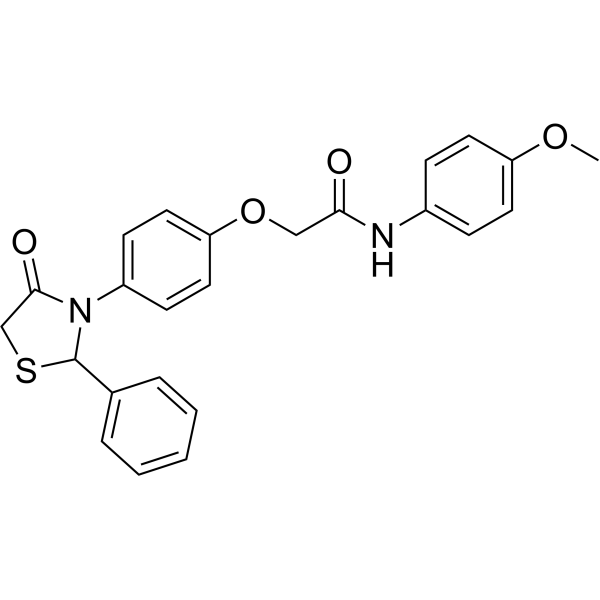
- HY-145867
-
|
|
Topoisomerase
EGFR
CDK
Apoptosis
|
Cancer
|
|
EGFR-IN-45 is a potent epidermal growth factor receptor (EGFR) pan inhibitor, with IC50s of 0.4 µM and 1.6 µM for EGFR and CDK2, respectively. EGFR-IN-45 also inhibit Topo I and Topo II. EGFR-IN-45 arrests cancer cells in the pre-G1 phase and induces apoptosis .
|
-
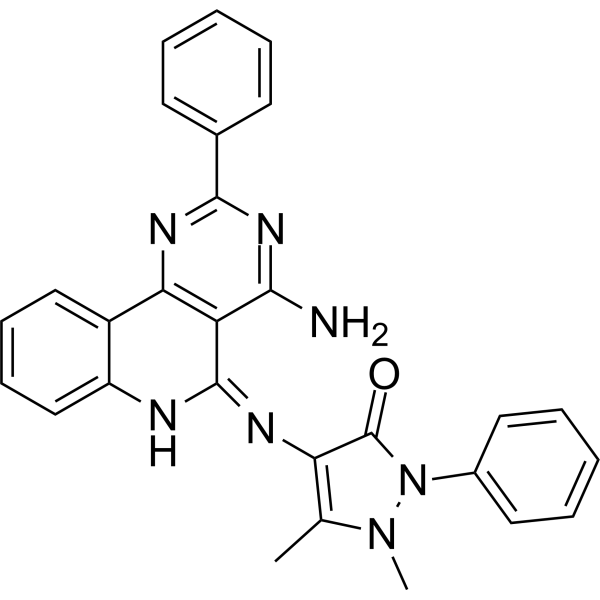
- HY-150791
-
|
|
Reactive Oxygen Species
DNA/RNA Synthesis
|
Cancer
|
|
FLDP-5 is a blood-brain barrier (BBB) penetrant curcuminoid analogues. FLDP-5 can induce production of ROS (Reactive Oxygen Species), DNA damage and cell cycle S phase arrest. FLDP-5 exhibits highly potent tumour-suppressive effects with anti-proliferative and anti-migratory activities on LN-18 cells .
|
-
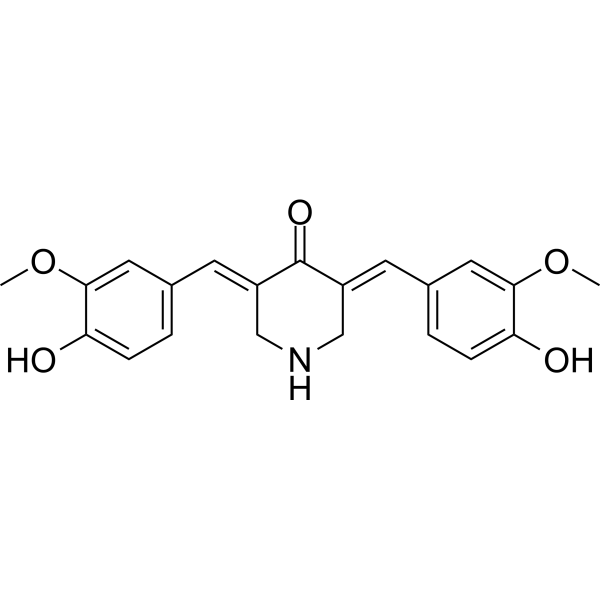
- HY-157323
-
|
|
HDAC
Apoptosis
|
Cancer
|
|
HDAC6-IN-28 (compound 10C) is a potent inhibitor of HDAC6 with an IC50 of 261 nM. HDAC6-IN-28 significantly induces apoptosis and S-phase arrest in B16-F10 cells. HDAC6-IN-28 efficiently increases the expression of acetylated-α-tubulin in vitro and in vivo .
|
-
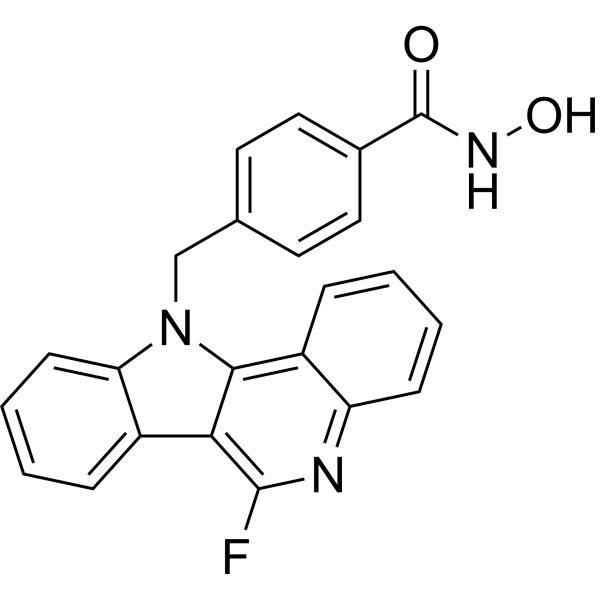
- HY-146491
-
|
|
VEGFR
Raf
Apoptosis
|
Cancer
|
|
VEGFR-2/BRAF-IN-1 (Compound 4b) is a dual VEGFR-2 and BRAF kinases inhibitor with IC50 values of 0.049, 0.063 and 0.005 µM against VEGFR-2, BRAF V600E and BRAF WT, respectively. VEGFR-2/BRAF-IN-1 induces apoptosis and arrests the cell cycle mainly in the G1/S phase .
|
-
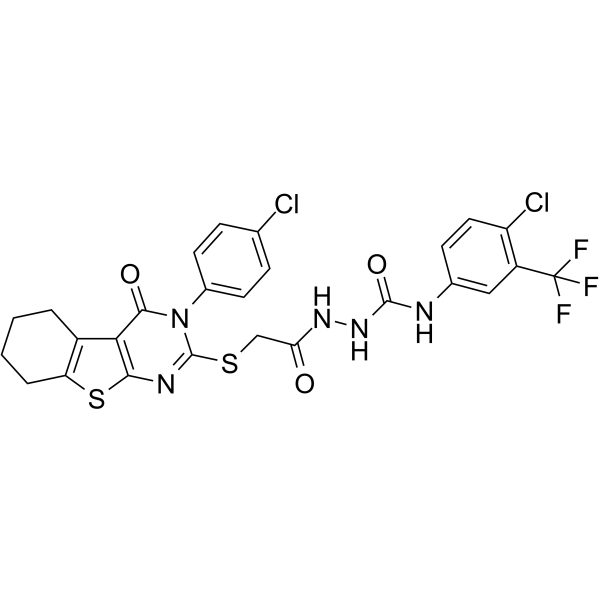
- HY-156470
-
|
|
Trk Receptor
Anaplastic lymphoma kinase (ALK)
c-Kit
EGFR
Pim
Casein Kinase
Checkpoint Kinase (Chk)
CDK
Apoptosis
|
Cancer
|
|
Multi-kinase-IN-6 (compound 10e) is a multikinase inhibitor that shows good enzyme inhibitory activity against TrkA, ALK2, c-KIT, EGFR, PIM1, CK2α, CHK1, and CDK2. Multi-kinase-IN-6 reveals antiproliferative activity against MCF7, HCT116 and EKVX with IC50 values of 3.36 μM, 1.40 μM and 3.49 μM, respectively. Multi-kinase-IN-6 shows cell cycle arrest at the G1/S phase and G1 phase in MCF7 and HCT116 cells with good apoptotic effect .
|
-
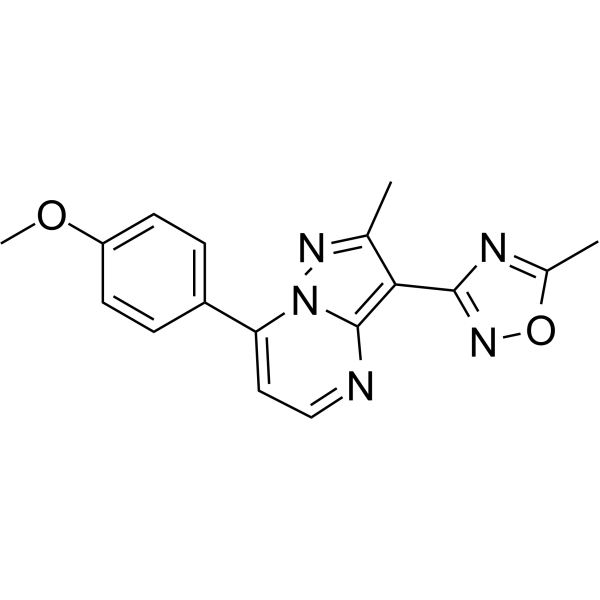
- HY-W016099S
-
|
MQCA-d4
|
Isotope-Labeled Compounds
|
Cancer
|
|
3-Methyl-2-quinoxalinecarboxylic acid-d4 is the deuterium labeled 3-Methyl-2-quinoxalinecarboxylic acid. 3-Methyl-2-quinoxalinecarboxylic acid (MQCA), an important N-oxide reductive metabolite of Quinocetone or Olaquindox, potently inhibits the growth of Chang liver cells through S phase arrest of the cell cycle[1].
|
-
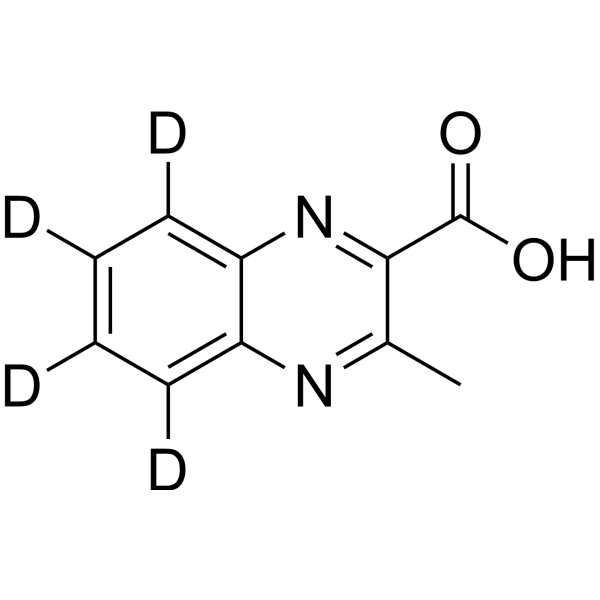
- HY-144811
-
|
|
CDK
Apoptosis
|
Cancer
|
|
CDK2-IN-9 is a potent CDK2 inhibitor with an IC50 of 0.63 µM. CDK2-IN-9 shows antiproliferative activity. CDK2-IN-9 induces apoptosis and cell cycle arrest at S and G2/M phase. CDK2-IN-9 has the potential for the research of melanoma .
|
-
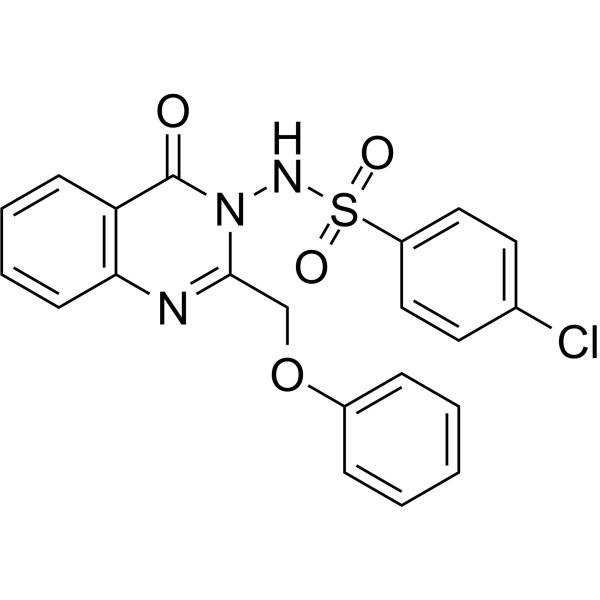
- HY-146200
-
|
|
PI3K
mTOR
|
Cancer
|
|
PI3K/mTOR Inhibitor-8 (Compound 18b) is a PI3K and mTOR dual inhibitor with IC50 values of 0.46 nM and 12 nM against PI3Kα and mTOR, respectively. PI3K/mTOR Inhibitor-8 induces HCT-116 cells apoptosis and arrests cell cycle at the G1/S phase .
|
-
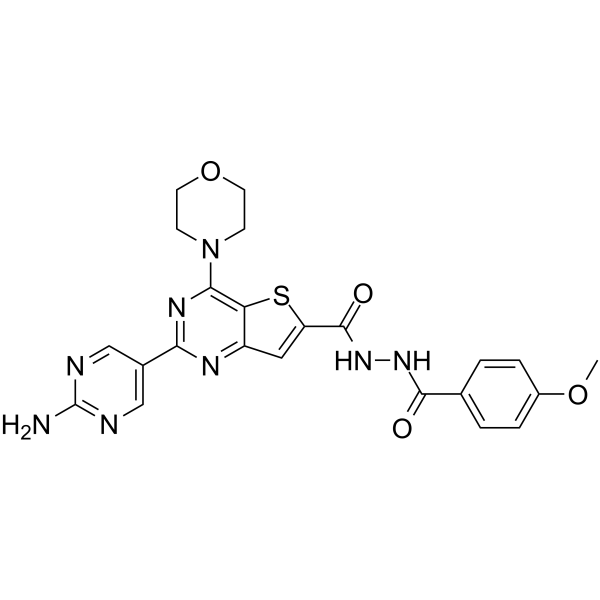
- HY-151984
-
|
|
CDK
|
Cancer
|
|
CDK9-IN-22 is a potent CDK9 inhibitor with IC50s of 10.4, 876.2 nM for CDK9, CDK, respectively. CDK9-IN-22 induces apoptosis and cell cycle arrests at G2/M phase. CDK9-IN-22 decreases the expression of p-RNAPII (S2) and CDK9 protein. CDK9-IN-22 shows antiproliferative and aiti-tumor activity .
|
-
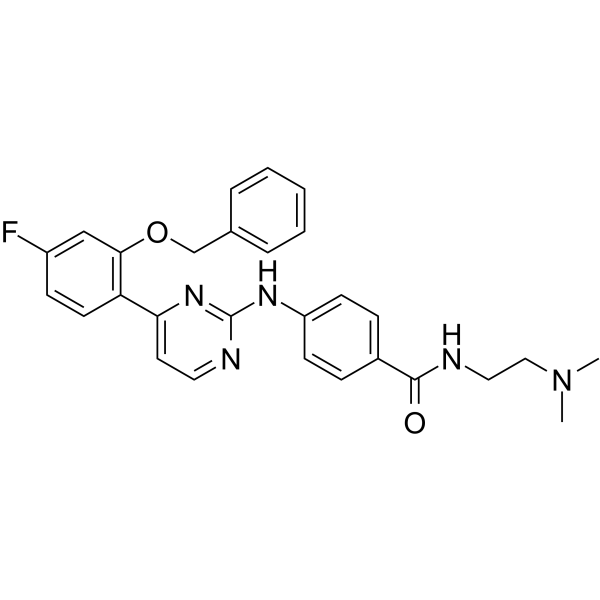
- HY-156114
-
|
|
EGFR
CDK
|
Cancer
|
|
EGFR/CDK2-IN-2 (compound 6a) is a dual inhibitor of EGFR and CDK-2 with IC50s of 19.6 and 87.9 nM, respectively. EGFR/CDK2-IN-2 induces apoptosis in MCF-7 cells and arrests the cell cycle in the S phase. EGFR/CDK2-IN-2 has significant anti-cancer cell toxicity and inhibits MCF-7 with an IC50 of 0.39 μM .
|
-
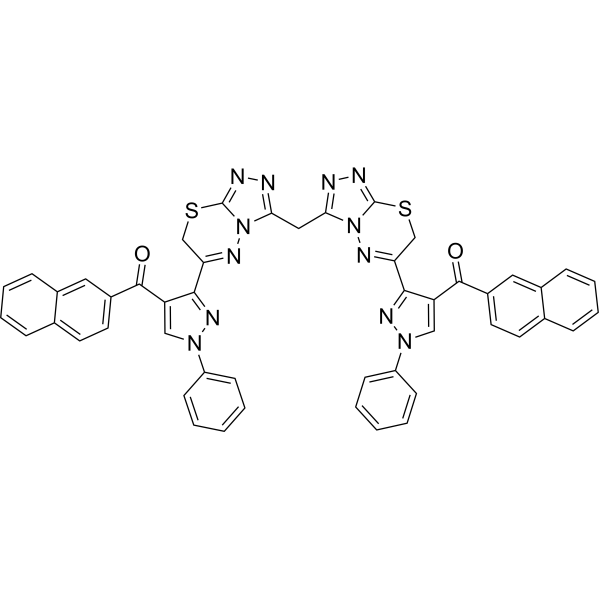
- HY-156115
-
|
|
EGFR
CDK
|
Cancer
|
|
EGFR/CDK2-IN-3 (compound 4b) is a dual inhibitor of EGFR and CDK-2 with IC50s of 71.7 and 113.7 nM, respectively. EGFR/CDK2-IN-3 induces apoptosis in MCF-7 cells and arrests the cell cycle in the S phase. EGFR/CDK2-IN-3 has significant anti-cancer cell toxicity and inhibits MCF-7 with an IC50 of 3.16 μM .
|
-
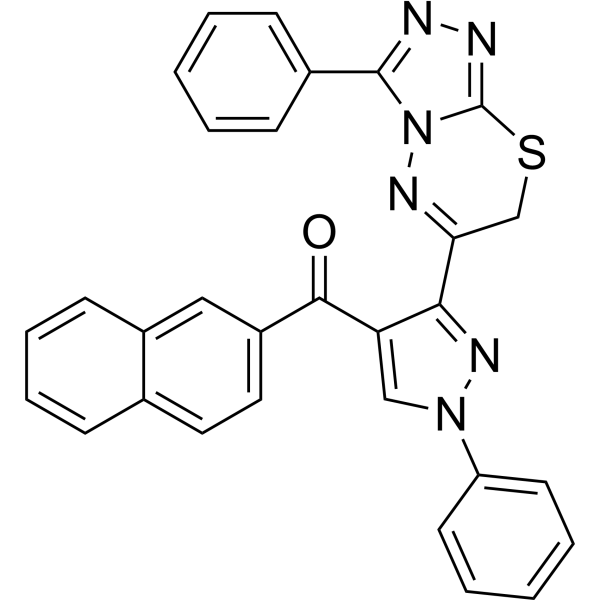
- HY-156116
-
|
|
EGFR
CDK
|
Cancer
|
|
EGFR/CDK2-IN-4 (compound 4c) is a dual inhibitor of EGFR and CDK-2 with IC50s of 89.6 and 165.4 nM, respectively. EGFR/CDK2-IN-4 induces apoptosis in MCF-7 cells and arrests the cell cycle in the S phase. EGFR/CDK2-IN-4 has significant anti-cancer cell toxicity and inhibits MCF-7 with an IC50 of 2.74 μM .
|
-
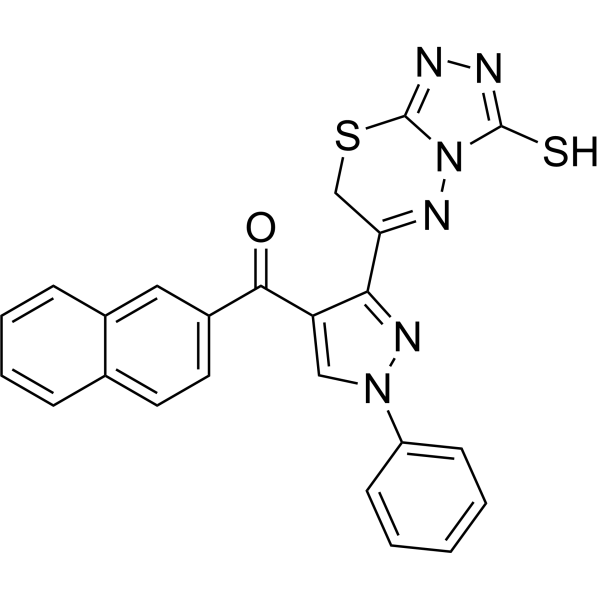
- HY-149630
-
|
|
VEGFR
HDAC
Apoptosis
|
Cancer
|
|
VEGFR2/HDAC1-IN-1 (compound 13) is a potent VEGFR-2/HDAC dual inhibitor, with IC50s of 57.83 nM and 9.82 nM, respectively. VEGFR2/HDAC1-IN-1 arrests the cell cycle at the S and G2 phases, and induces apoptosis in HeLa cells. VEGFR2/HDAC1-IN-1 exhibits anti-angiogenic effect .
|
-
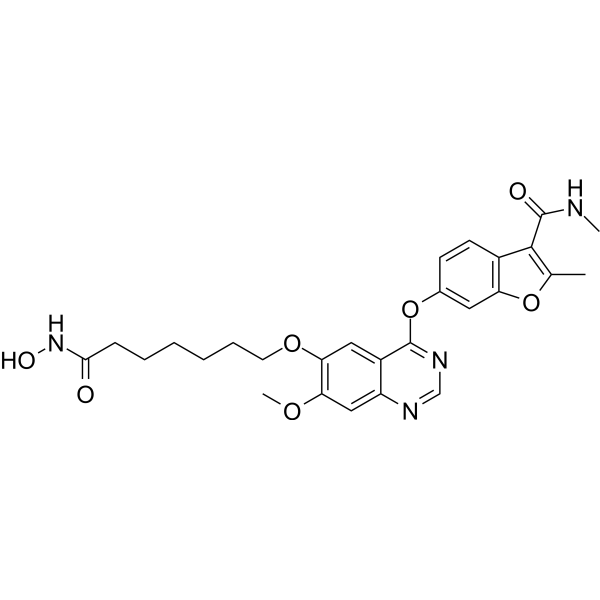
- HY-15149
-
Romidepsin
Maximum Cited Publications
43 Publications Verification
FK 228; FR 901228; NSC 630176
|
HDAC
Apoptosis
|
Cancer
|
|
Romidepsin (FK 228) is a Histone deacetylase (HDAC) inhibitor with anti-tumor activities. Romidepsin (FK 228) inhibits HDAC1, HDAC2, HDAC4, and HDAC6 with IC50s of 36 nM, 47 nM, 510 nM and 1.4 μM, respectively . Romidepsin (FK 228) is produced by Chromobacterium violaceum, induces cell G2/M phase arrest and apoptosis .
|
-
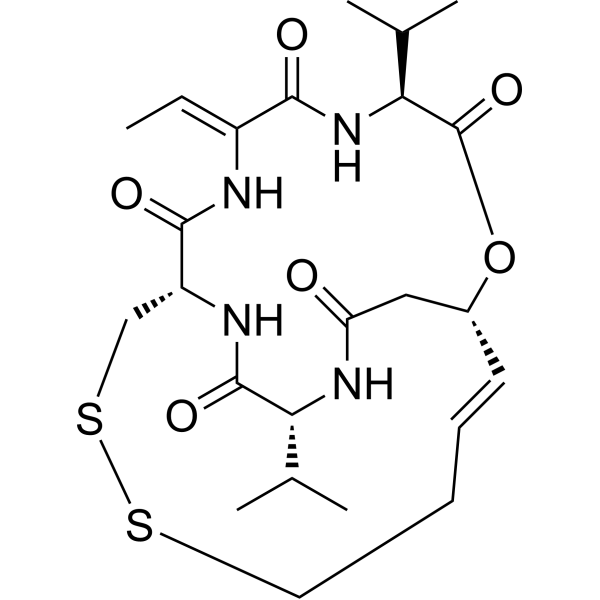
- HY-146105
-
|
|
Apoptosis
MDM-2/p53
MMP
Bcl-2 Family
Reactive Oxygen Species
|
Cancer
|
|
Anticancer agent 65 (compound 4c) shows excellent activity in cancer cell lines, especially A549 cells, with an IC50 of 1.07 μM. Anticancer agent 65 induces S-phase arrest in A549 cells and increases the expression level of p53 and p21. Anticancer agent 65 causes apoptosis, ROS generation and collapse of MMP in A549 cells .
|
-
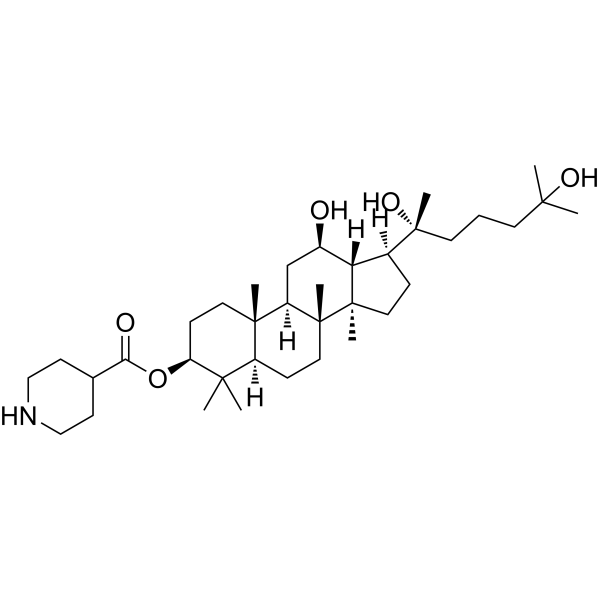
- HY-151436
-
|
|
CDK
Cholinesterase (ChE)
Apoptosis
|
Cancer
|
|
ZLMT-12 (compound 35), tacrine derivatives, is a potent, orally active CDK2/9 inhibitor with IC50 values of 0.002 and 0.011 μM for CDK9 and CDK2, respectively. ZLMT-12 has a weak inhibitory effect on AChE (IC50=19.023 μM) and BChE (IC50=2.768 μM). ZLMT-12 has low toxicity and antiproliferative activity. ZLMT-12 induces apoptosis and arrests the cell cycle in the S phase and G2/M phase .
|
-
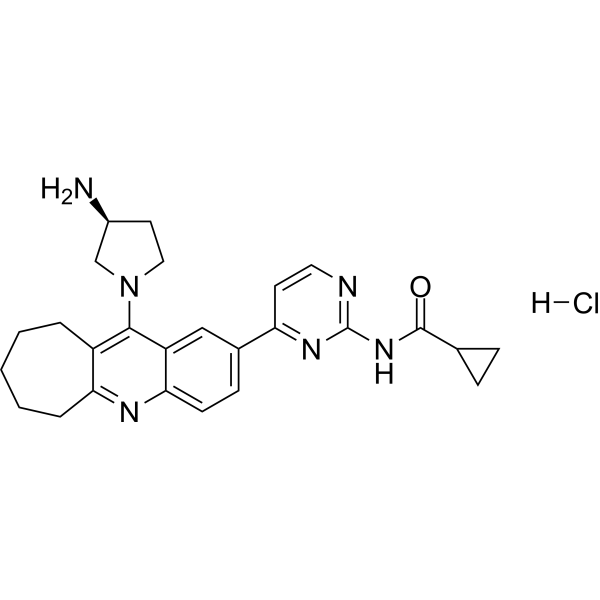
- HY-147862
-
|
|
EGFR
Apoptosis
|
Cancer
|
|
EGFR-IN-62 (compound 9h) is a potent and reversible EGFR kinase inhibitor, with IC50 values of 10 nM (L858R/T790 M), 29 nM (WT), and 242 nM (L858R/T790 M/C797S), respectively. EGFR-IN-62 shows antiproliferative activity against A549 and H1975 cell lines, with IC50 values of 2.53 and 1.56 μM, respectively. EGFR-IN-62 induces dose-dependent apoptosis process, G1/G0-phase arrestation, and the inhibition of motility on A549 and/or H1975 cell lines .
|
-
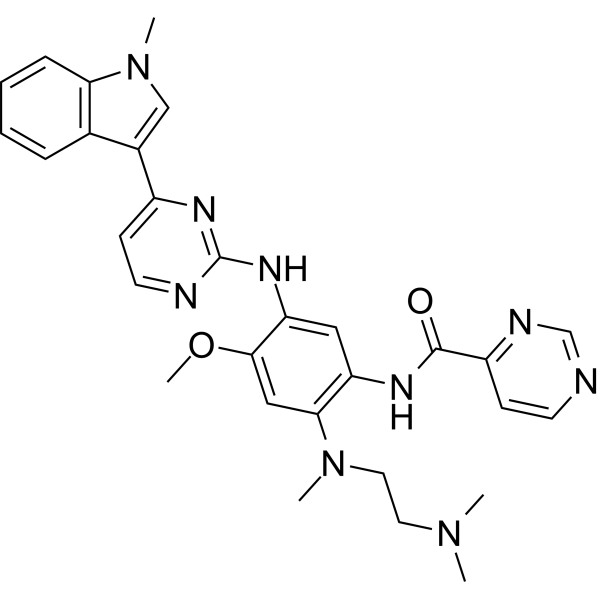
- HY-157419
-
|
7-(4-Ethylphenyl)-FL118
|
Apoptosis
|
Cancer
|
|
FL77-24, a FL118 analog and apoptosis inducer, possesses antitumor activity, with IC50 values of 99.4 nM, 118 nM, <6.4 nM, 28.5 nM and <6.4 nM in HCT116, HepG2, MCF-7, A549 and HeLa cells, respectively. FL77-24 mainly causes cell cycle arrest in S and G2/M phases .
|
-
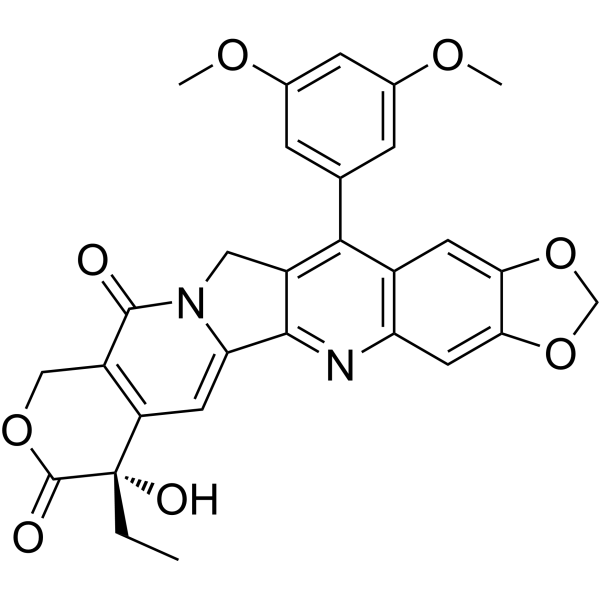
- HY-149633
-
|
|
EGFR
Dihydrofolate reductase (DHFR)
Apoptosis
|
Cancer
|
|
EGFR/HER2/DHFR-IN-3 (compound 4c) is a potent dual inhibitor of EGFR/HER2, with IC50s of 0.138 and 0.092 μM, respectively. EGFR/HER2/DHFR-IN-3 also inhibits DHFR, with an IC50 of 0.193 M. EGFR/HER2/DHFR-IN-3 causes arrest at the S phase of the cell cycle and induces apoptosis in MCF7 breast cancer cells .
|
-
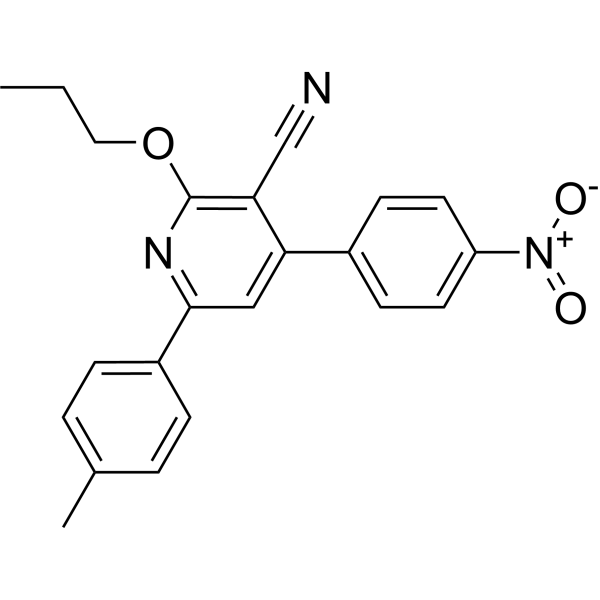
- HY-146683
-
|
|
Aldehyde Dehydrogenase (ALDH)
Apoptosis
|
Cancer
|
|
KS106 is a potent ALDH inhibitor with IC50s of 334, 2137, 360 nM for ALDH1A1, ALDH2, and ALDH3A1, respectively. KS106 shows antiproliferative and anticancer effects with low low toxic.KS106 significantly increases ROS activity, lipid peroxidation and toxic aldehyde accumulation. KS106 induces apoptosis and cell cycle arrest at the G2/M phase .
|
-
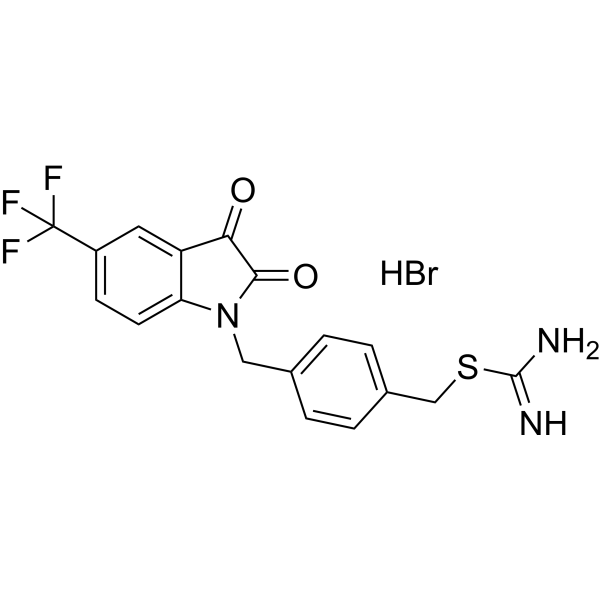
- HY-146682
-
|
|
Aldehyde Dehydrogenase (ALDH)
Apoptosis
|
Cancer
|
|
KS100 is a potent ALDH inhibitor with IC50s of 230, 1542, 193 nM for ALDH1A1, ALDH2, and ALDH3A1, respectively. KS100 shows antiproliferative and anticancer effects with low low toxic. KS100 significantly increases ROS activity, lipid peroxidation and toxic aldehyde accumulation. KS10600 induces apoptosis and cell cycle arrest at the G2/M phase .
|
-
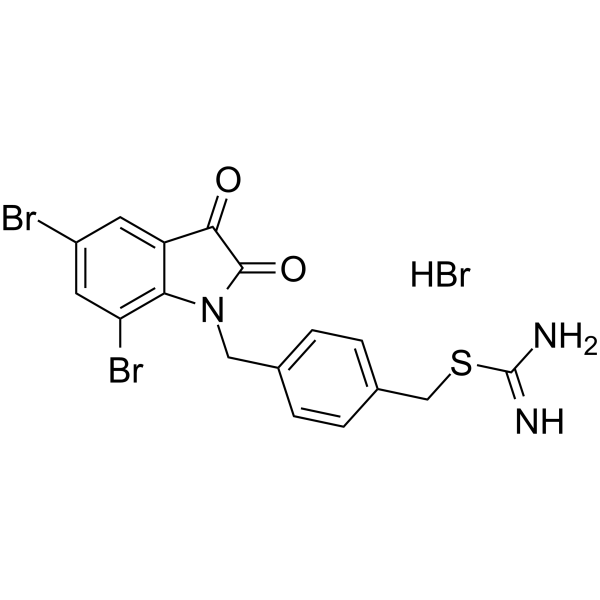
- HY-157165
-
|
|
Microtubule/Tubulin
PARP
|
Cancer
|
|
Tubulin/PARP-IN-1 (compound 14) is a dual PARP-tubulin inhibitor with activity against endometrial cancer. Tubulin/PARP-IN-1 inhibits PARP and tubulin with IC50s of 74 nM (PARP1), 109 nM (PARP2), and 1.4 μM (Microtubule/Tubulin), respectively. Tubulin/PARP-IN-1 can induce apoptosis and autophagy and cause cell cycle arrest in the G2/M phase .
|
-
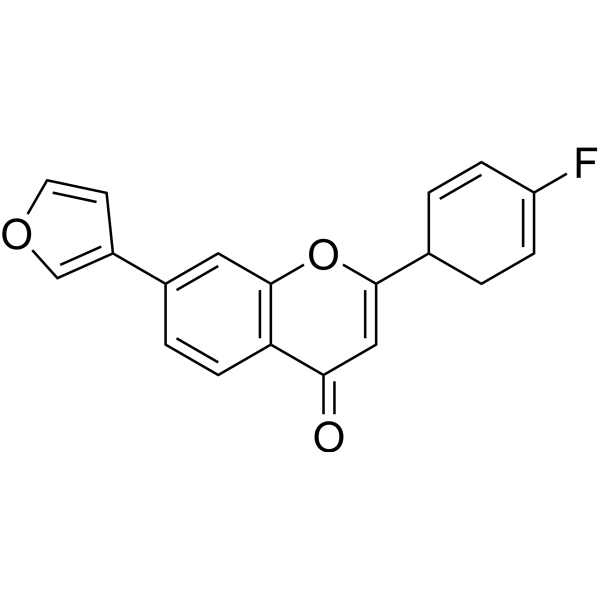
- HY-162332
-
|
|
Apoptosis
EGFR
JNK
|
Cancer
|
|
EGFR-PK/JNK-2-IN-1 (Compound 6c) is a dual inhibitor of EGFR-PK and JNK-2 with IC50s of 2.7 and 3.0 μM, respectively. EGFR-PK/JNK-2-IN-1 can induce apoptosis and induce cell cycle arrest at different cell phases. EGFR-PK/JNK-2-IN-1 can be used for the research of cancer .
|
-
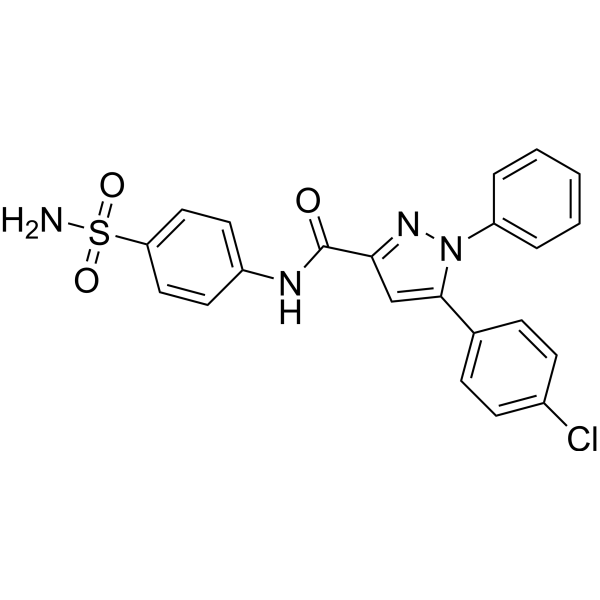
- HY-155358
-
|
|
EGFR
Apoptosis
|
Cancer
|
|
Os30, a potent fourth-generation EGFR inhibitor, is a potent EGFRC797S-TK inhibitor with IC50 values of 18 nM and 113 nM for EGFRDel19/T790M/C797S TK and EGFRL858R/T790M/C797S TK, respectively. Os30 can suppress EGFR phosphorylation, arrest at G1 phase and induce the apoptosis of KC-0116 (BaF3-EGFRDel19/T790M/C797S) cells. Os30 shows potent antitumor efficacy on non-small cell lung cancer (NSCLC) with EGFmRC797S mutation .
|
-
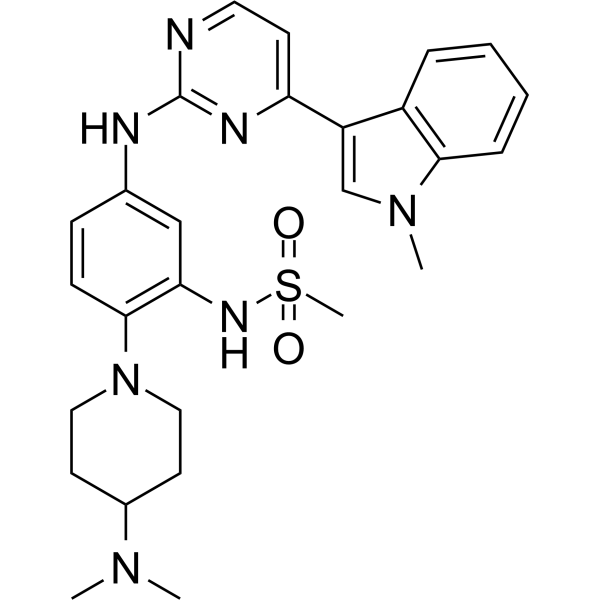
- HY-114414
-
|
|
HDAC
mTOR
Apoptosis
|
Cancer
|
|
HDACs/mTOR Inhibitor 1 is a dual HDACs and mTOR inhibitor, with IC50s of 0.19 nM, 1.8 nM, 1.2 nM for HDAC1, HDAC6, mTOR, respectively. HDACs/mTOR Inhibitor 1 stimulates cell cycle arrest in G0/G1 phase and induces tumor cell apoptosis with low toxicity in vivo. HDACs/mTOR Inhibitor 1 can be used in the research of hematologic malignancies .
|
-
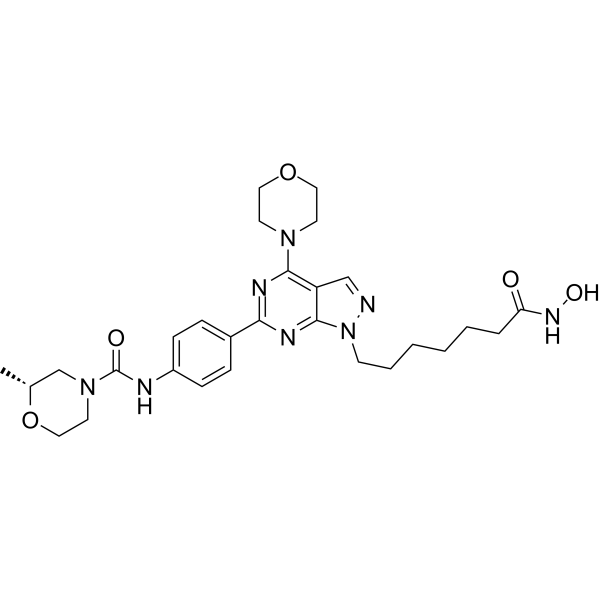
- HY-147935
-
|
|
Akt
|
Cancer
|
|
NTQ1062 is a potent and orally active Akt inhibitor with IC50s of 0.4 nM, 6.3 nM and 0.1 nM for Akt1, Akt2 and Akt3, respectively. NTQ1062 induces cell apoptosis and arrests the cell cycle at G0/G1 phase. NTQ1062 exhibits antiproliferation activity against various cancer cells. NTQ1062 exhibits potent antitumor efficacy in LNCap xenograft mouse model .
|
-
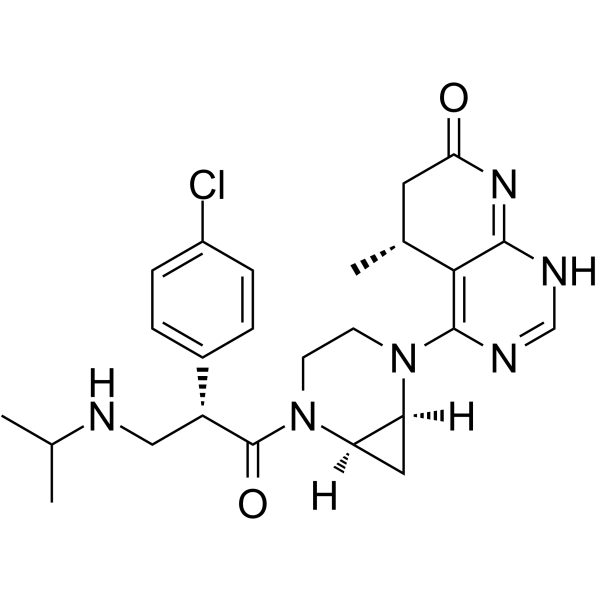
- HY-151630
-
|
|
Carbonic Anhydrase
|
Cancer
|
|
hCAIX-IN-16 (Compound 12d) is hCA IX inhibitor, with Ki values of 190.0 and 187.9 nM for hCA IX and hCA XII, respectively. hCAIX-IN-16 can arrest the cell cycle of breast cancer MDA-MB-468 in G0-G1 and S phase and induce apoptosis. hCAIX-IN-16 shows good broad-spectrum anticancer activity and can be used for cancer research .
|
-
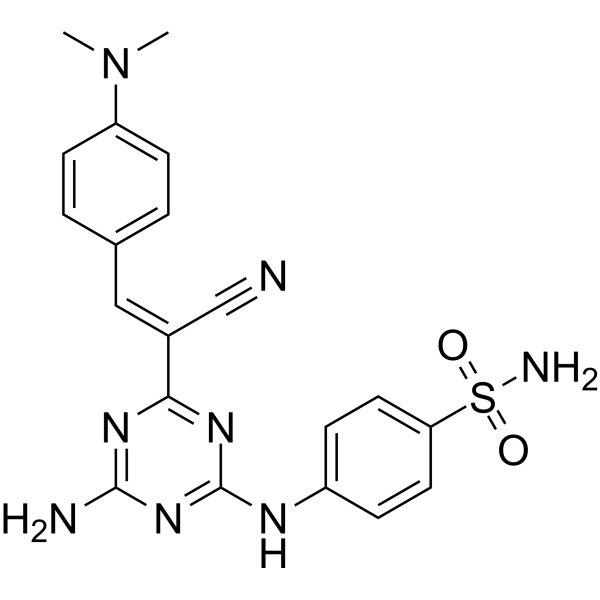
- HY-142076
-
|
|
CDK
|
Cancer
|
|
CDK4/6-IN-15 is an orally active and selective CDK4/6 inhibitor. CDK4/6-IN-15 potently inhibits cancer cells growth. CDK4/6-IN-15 arrests cell cycle at G1 phase and suppresses retinoblastoma tumour suppressor protein (Rb) phosphorylation at S780 and E2 factor (E2F)-regulated gene expression .
|
-
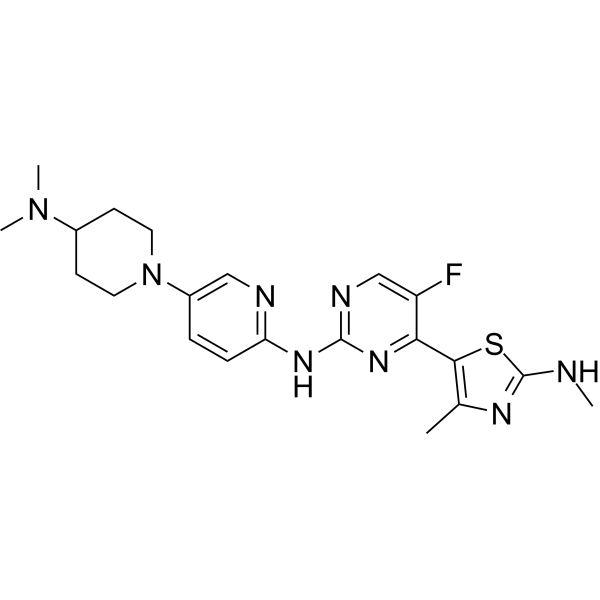
- HY-149912
-
|
|
Polo-like Kinase (PLK)
Trk Receptor
Apoptosis
|
Cancer
|
|
CZS-241 is an orally active and selective inhibitor of Polo-like Kinase (PLK) 4 (IC50=2.6 nM). CZS-241 inhibits TRKA with an IC50 value of 2.74 μM. CZS-241 induces apoptosis and arrests cell cycle at S/G2 phase. CZS-241 shows highly potent antiproliferative activity against leukemia cell lines, and exhibits safety against normal cell lines .
|
-
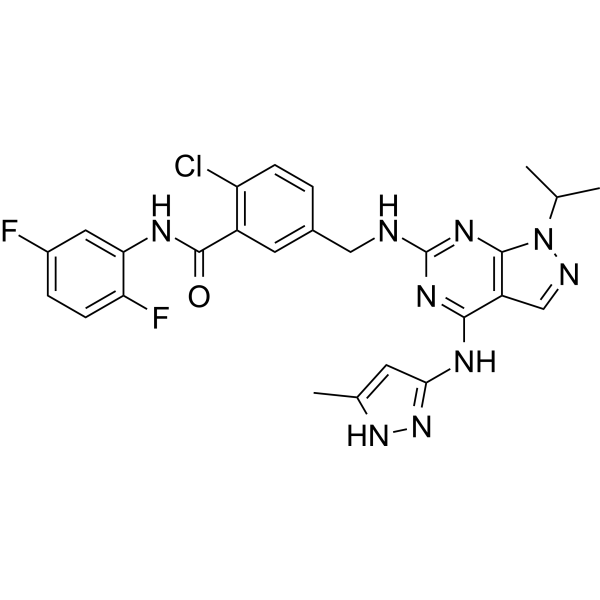
- HY-128912
-
|
|
Histone Demethylase
|
Cancer
|
|
Arborinine is a potent and orally activeLSD1 inhibitor. Arborinine increases the expression of H3K4me1/2, H3K9me1/2, E-cad protein and decreases the expression of UBE2O protein level. Arborinine induces cell cycle arrest at S phase. Arborinine shows antitumor activity .
|
-
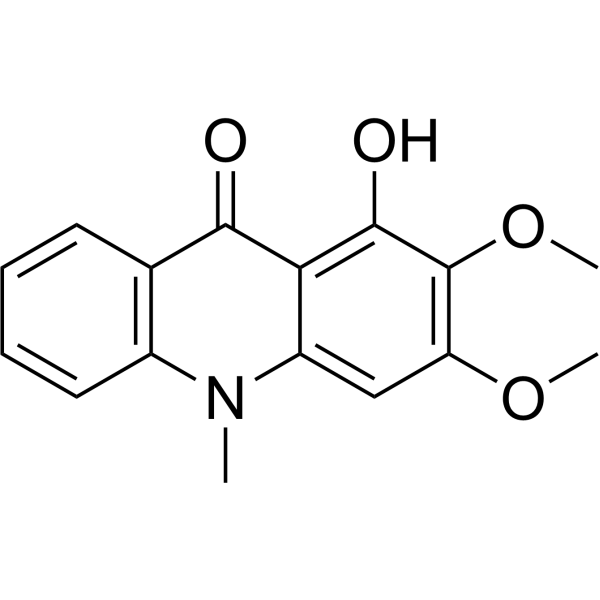
- HY-158049
-
|
|
Apoptosis
Ferroptosis
|
Cancer
|
|
Anticancer agent 199 (Compound G-4) induces apoptosis in triple negative breast cancer (TNBC) cells via the mitochondrial pathway through inhibiting EGFR, AKT and MAPK pathways. Anticancer agent 199 also induces Ferroptosis by down-regulating LCN2. Anticancer agent 199 inhibits TNBC cell viability and migration, and induces S phase cell cycle arrest. Anticancer agent 199 is a derivate of cyclin-dependent kinase inhibitor Rocovitine .
|
-
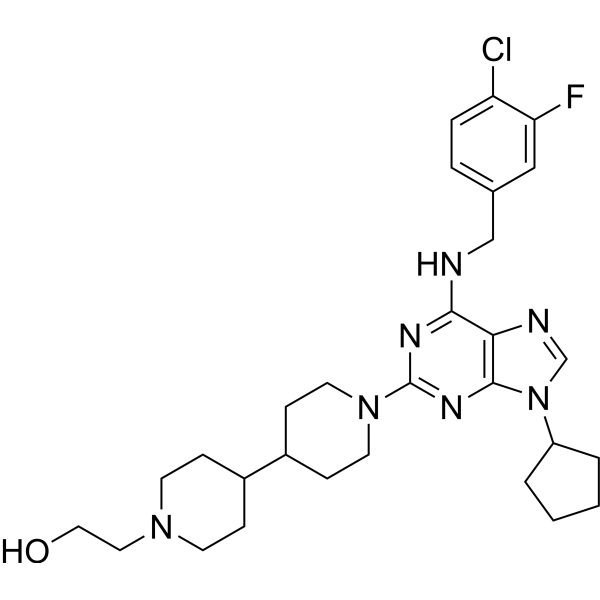
- HY-141512
-
|
|
PROTACs
Aurora Kinase
|
Cancer
|
|
JB170 is a potent and highly specific PROTAC-mediated AURORA-A (Aurora Kinase) degrader (DC50=28 nM) by linking Alisertib, to the Cereblon-binding molecule Thalidomide. JB170 preferentially binds AURORA-A (EC50=193 nM) over AURORA-B (EC50=1.4 µM). JB170-mediated S-phase arrest is caused specifically by AURORA-A depletion. JB170 has excellent ability to inhibit non-catalytic function of AURORA-A kinase .
|
-
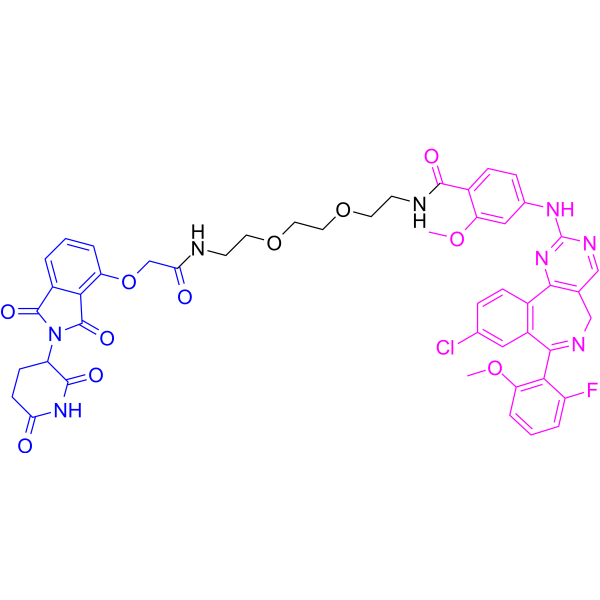
- HY-144777
-
|
|
FLT3
Apoptosis
|
Cancer
|
|
FLT3-IN-14 is a potent FLT3 inhibitor with IC50s of 5.6 nM and 1.4 nM for FLT3-WT and FLT3-ITD. FLT3-IN-14 reduces the phosphorylation of FLT3 (Y591), induces cell cycle arrest at G1 phase and apoptosis. FLT3-IN-14 significantly reduces the tumor growth in an MV4-11 xenograft mouse model .
|
-
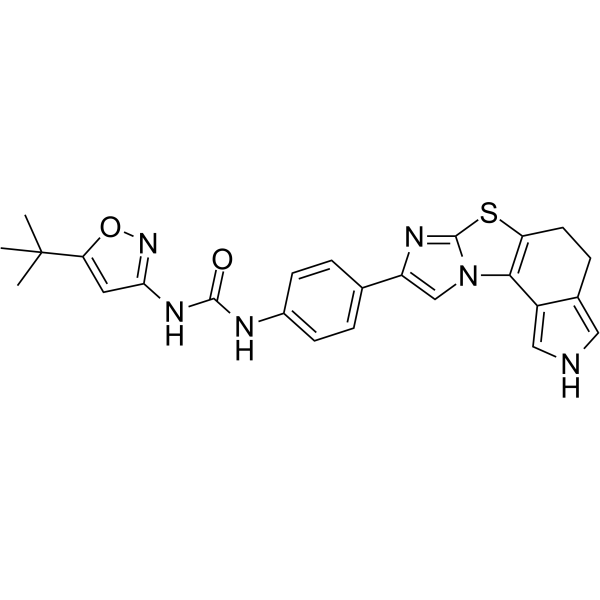
- HY-144293
-
|
|
Apoptosis
HDAC
|
Cancer
|
|
HDAC-IN-31 is a potent, selective and orally active HDAC inhibitor with IC50s of 84.90, 168.0, 442.7, >10000 nM for HDAC1, HDAC2, HDAC3, HDAC8, respectively. HDAC-IN-31 induces apoptosis and cell cycle arrests at G2/M phase. HDAC-IN-31 shows good antitumor efficacy. HDAC-IN-31 has the potential for the research of diffuse large B-cell lymphoma .
|
-
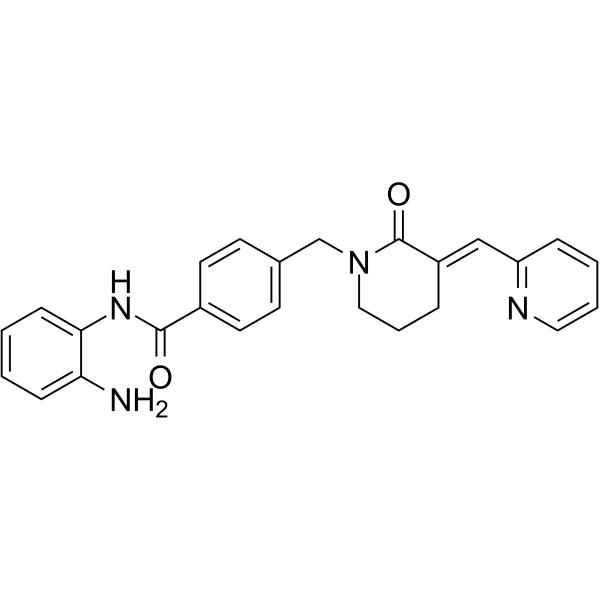
- HY-N2983
-
|
|
Tyrosinase
|
Others
|
|
Cajanin is a potent and orally active anti-melanogenic agent. Cajanin shows antiproliferative activity in MNT1 Cells. Cajanin efficiently decreases the melanin content. Cajanin down-regulates the mRNA and protein expression levels of MITF, tyrosinase, TRP-1 and Dct (TRP-2). Cajanin induces cell cycle arrest at G2/M and S phase. Cajanin stimulates osteoblast proliferation. Cajanin has the potential for the research of human hyperpigmented disorders and menopausal osteoporosis .
|
-
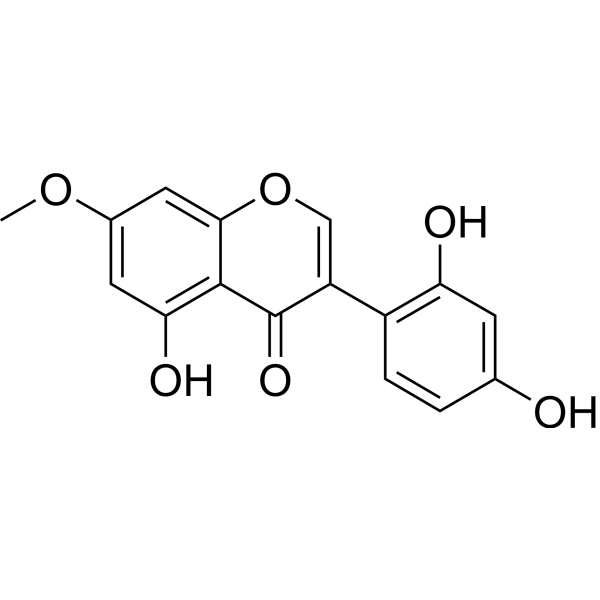
- HY-149029
-
|
|
HDAC
Apoptosis
Reactive Oxygen Species
|
Cancer
|
|
TH-6 is a potent HDAC inhibitor with IC50s of 0.115, 0.135, 0.242, 0.138, 2.120 µM for HDAC1, HDAC2, HDAC3, HDAC6, HDAC8, respectively. TH-6 inhibits cell migration and invasion. TH-6 induces apoptosis and cell cycle arrest at G2/M phase. TH-6 shows anti-tumor activity .
|
-
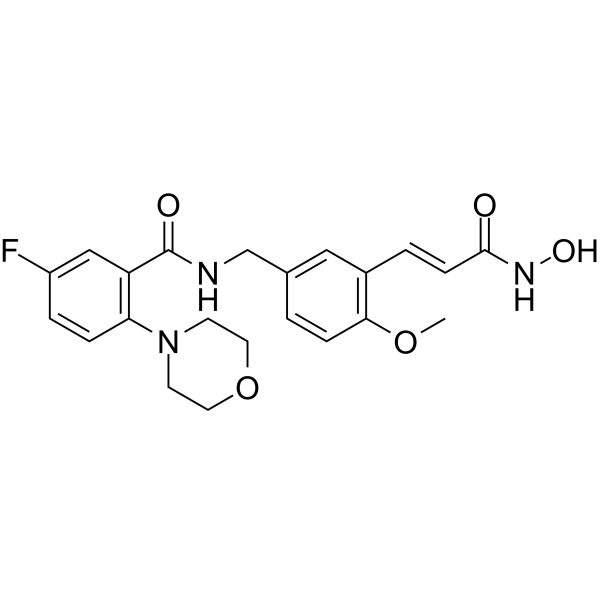
- HY-161372
-
|
|
PARP
c-Met/HGFR
Apoptosis
|
Cancer
|
|
PARP1/c-Met-IN-1 (Compound 16) is a selective dual inhibitor for PARP1 and c-Met, with IC50s of 3.3 and 32.2 nM, respectively. PARP1/c-Met-IN-1 induces cell apoptosis and cell cycle arrest in G2/M phase in MDA-MB-231 cells. PARP1/c-Met-IN-1 exhibits antitumor activity in mice .
|
-
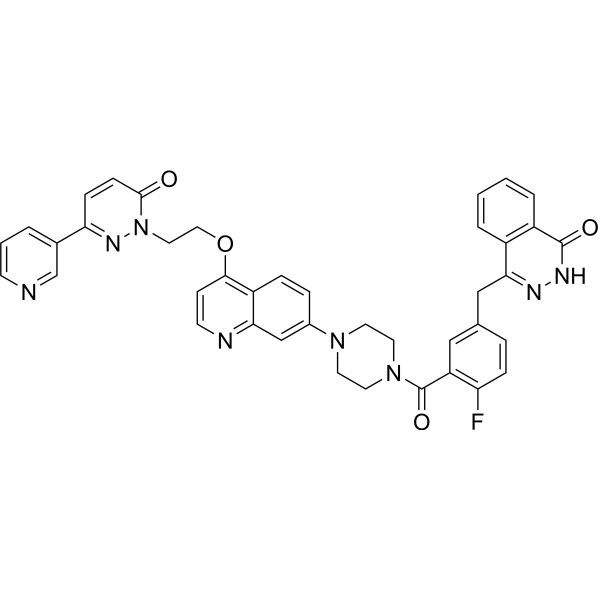
- HY-W025074
-
|
|
Sirtuin
Histone Methyltransferase
|
Cancer
|
|
BML-278 is a SIRT1 activator (EC150: 1 μM). BML-278 increases H3K9 methylation and inhibits H3K9 acetylation in both the paternal and maternal pronucleus. BML-278 improves early embryonic development. BML-278 arrests the cell cycle at the G1/S phase, and reduces senescence in primary human mesenchymal cells. BML-278 reduces tubulin acetylation in U937 cells. BML-278 also increases mitochondrial density in murine C2C12 myoblasts .
|
-
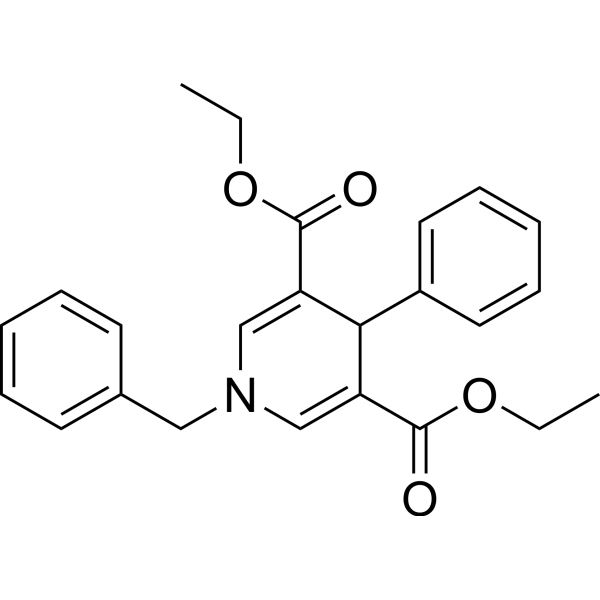
- HY-123938
-
|
CYH33
|
PI3K
|
Cancer
|
|
Risovalisib (CYH33) is an orally active, highly selective PI3Kα inhibitor with IC50s of 5.9 nM/598 nM/78.7 nM/225 nM against α/β/δ/γ isoform, respectively. Risovalisib inhibits phosphorylation of Akt, ERK and induces significant G1 phase arrest in breast cancer cells and non-small cell lung cancer (NSCLC) cells. Risovalisib has potent activity against solid tumors .
|
-
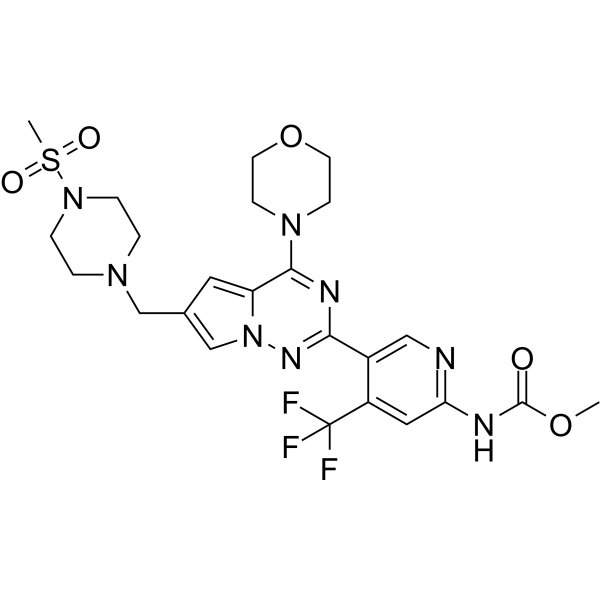
- HY-146887
-
|
|
Deubiquitinase
Apoptosis
|
Cancer
|
|
USP7-IN-9 is a highly potent ubiquitin-specific protease 7 (USP7) inhibitor with an IC50 value of 40.8 nM. USP7-IN-9 can induce apoptosis and arrest cell progression at G0/G1 and S phases in RS4; 11 cells. USP7-IN-9 reduces the protein levels of oncoproteins MDM2 and DNMT1 and increases the protein levels of tumor suppressors p53 and p21 .
|
-
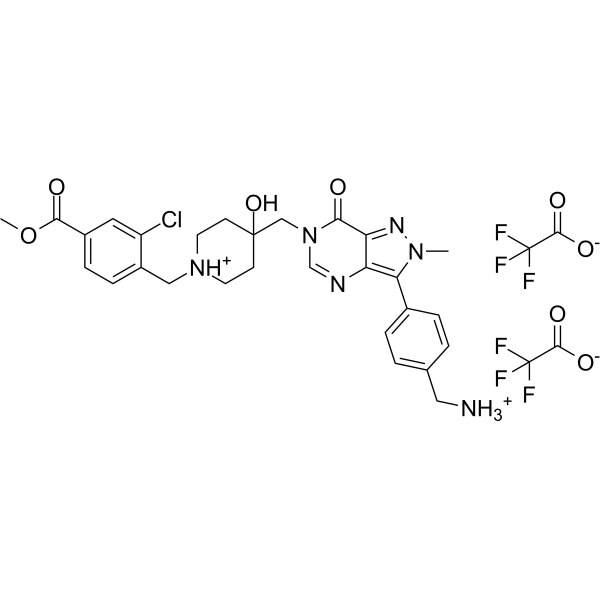
- HY-151443
-
|
|
HDAC
|
Cancer
|
|
HDAC-IN-47 is an orally active inhibitor of histone deacetylase (HDAC), with IC50s of 19.75 nM (HDAC1), 5.63 nM (HDAC2), 40.27 nM (HDAC3), 57.8 nM (HDAC2), 302.73 nM (HDAC8), respectively. HDAC-IN-47 inhibits autophagy and induces apoptosis via the Bax/Bcl-2 and caspase-3 pathways. HDAC-IN-47 arrests cell cycle at G2/M phase, and shows anti-tumor efficacy in vivo .
|
-
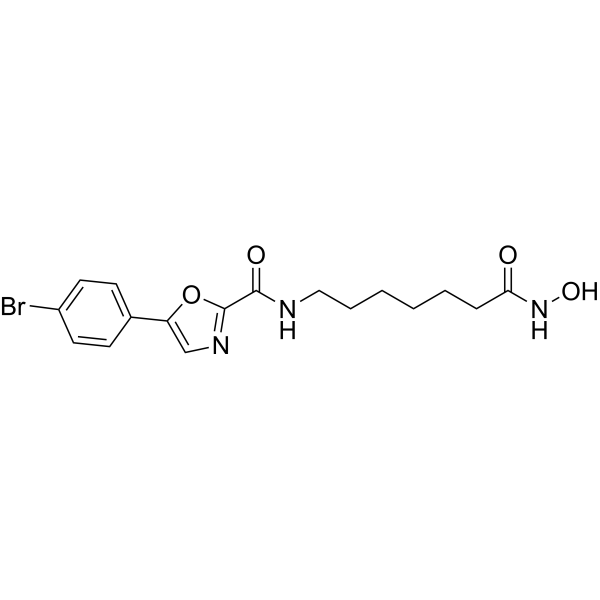
- HY-149979
-
|
|
Apoptosis
|
Cancer
|
|
SLC7A11-IN-1 is a potent solute carrier family 7 member 11 (SLC7A11, xCT) inhibitor. SLC7A11-IN-1 shows antiproliferative activity. SLC7A11-IN-1 inhibits cell invasion and metastasis. SLC7A11-IN-1 induces Apoptosis and cell cycle arrest at S-phase. SLC7A11-IN-1 shows anti-tumor activity .
|
-
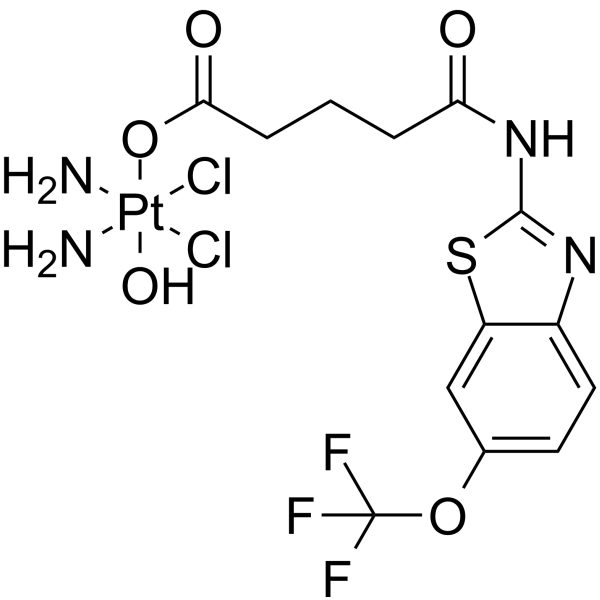
- HY-123450
-
|
|
Bcr-Abl
Apoptosis
PDGFR
|
Cancer
|
|
S116836, a potent, orally active BCR-ABL tyrosine kinase inhibitor, blocks both wild-type as well as T315I Bcr-Abl. S116836 arrests the cells in the G0/G1 phase of cell cycle, induces apoptosis, increases ROS production, and decreases GSH production in BaF3/WT and BaF3/T315I cells. S116836 also inhibits SRC, LYN, HCK, LCK and BLK, and receptor tyrosine kinases such as FLT3, TIE2, KIT, PDGFR-β. Antitumor activies . S116836 is a click chemistry reagent, it contains an Alkyne group and can undergo copper-catalyzed azide-alkyne cycloaddition (CuAAc) with molecules containing Azide groups.
|
-
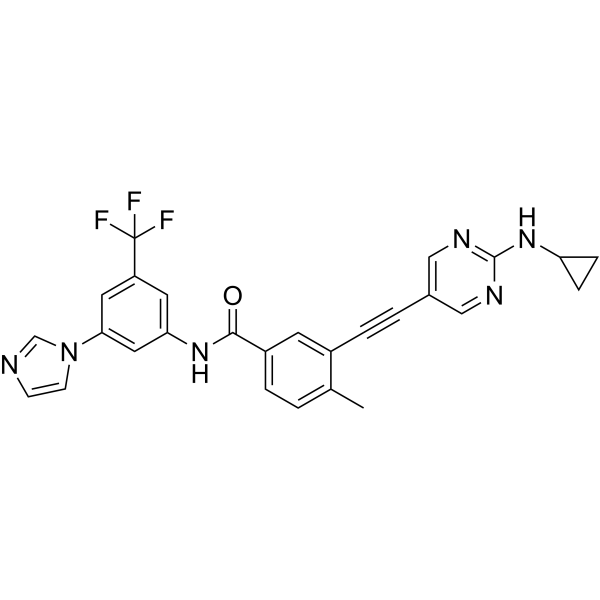
- HY-139604
-
|
|
Apoptosis
|
Cancer
|
|
PCC0208017 is a microtubule affinity regulating kinases (MARK3/MARK4) inhibitor with IC50s of 1.8 and 2.01 nM, respectively. PCC0208017 has much lower inhibitory activity against MARK1 and MARK2, with IC50s of 31.4 and 33.7 nM, respectively. PCC0208017 suppresses glioma progression in vitro and in vivo. PCC0208017 disrupts microtubule dynamics and induces G2/M phase cell cycle arrest and cell apoptosis. PCC0208017 demonstrates robust antitumor activity in vivo and displays good BBB permeability .
|
-
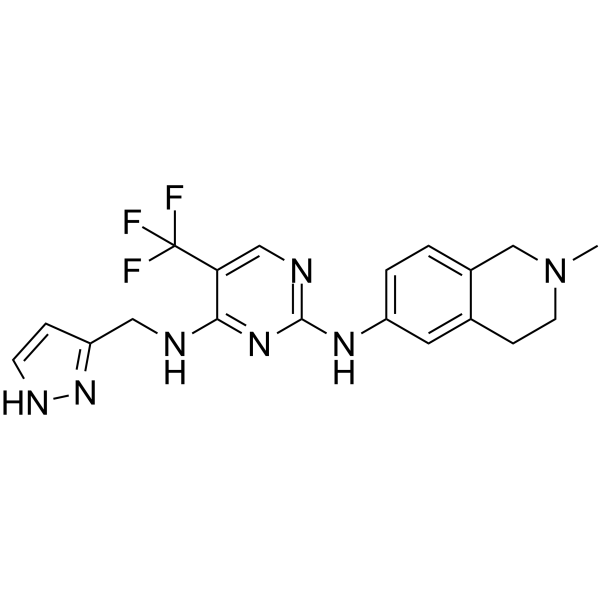
- HY-117102
-
|
|
Aryl Hydrocarbon Receptor
Checkpoint Kinase (Chk)
|
Cancer
|
|
ANI-7 is an activator of aryl hydrocarbon receptor (AhR) pathway. ANI-7 inhibits the growth of multiple cancer cells, and potently and selectively inhibits the growth of MCF-7 breast cancer cells with a GI50 of 0.56 μM. ANI-7 induces CYP1-metabolizing mono-oxygenases by activating AhR pathway, and also induces DNA damage, checkpoint Kinase 2 (Chk2) activation, S-phase cell cycle arrest, and cell death in sensitive breast cancer cell lines .
|
-
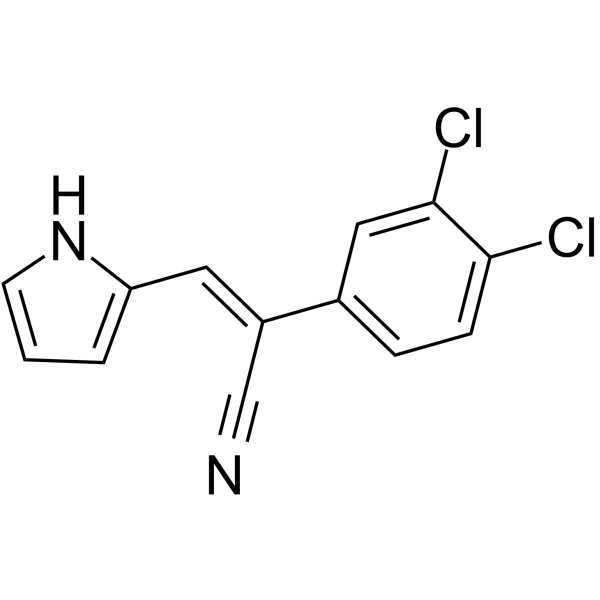
- HY-131906
-
|
|
JAK
FLT3
Apoptosis
|
Cancer
|
|
JAK2-IN-7 is a selective JAK2 inhibitor with IC50s of 3, 11.7, and 41 nM for JAK2, SET-2, and Ba/F3 V617F cells, respectively. JAK2-IN-7 possesses >14-fold selectivity over JAK1, JAK3, FLT3. JAK2-IN-7 stimulates cell cycle arrest in the G0/G1 phase and induces tumor cellapoptosis. Antitumor activities .
|
-
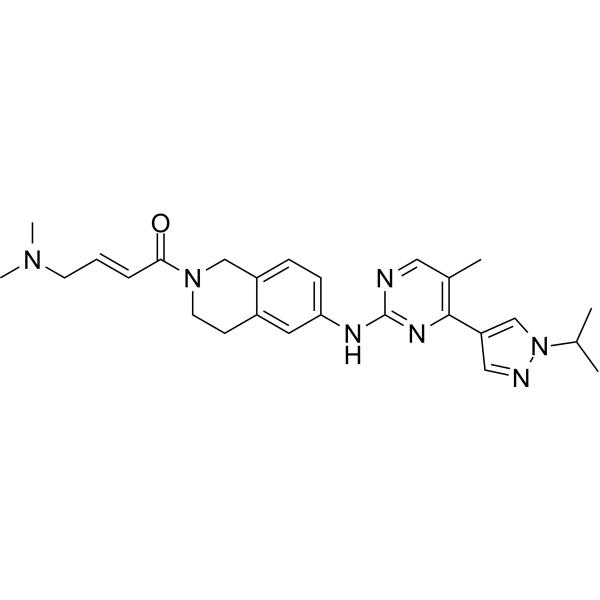
- HY-123938A
-
|
|
PI3K
|
Cancer
|
|
CYH33 methanesulfonate is an orally active, highly selective PI3Kα inhibitor with IC50s of 5.9 nM/598 nM/78.7 nM/225 nM against α/β/δ/γ isoform, respectively. CYH33 methanesulfonate inhibits phosphorylation of Akt, ERK and induces significant G1 phase arrest in breast cancer cells and non-small cell lung cancer (NSCLC) cells. CYH33 methanesulfonate has potent activity against solid tumors .
|
-
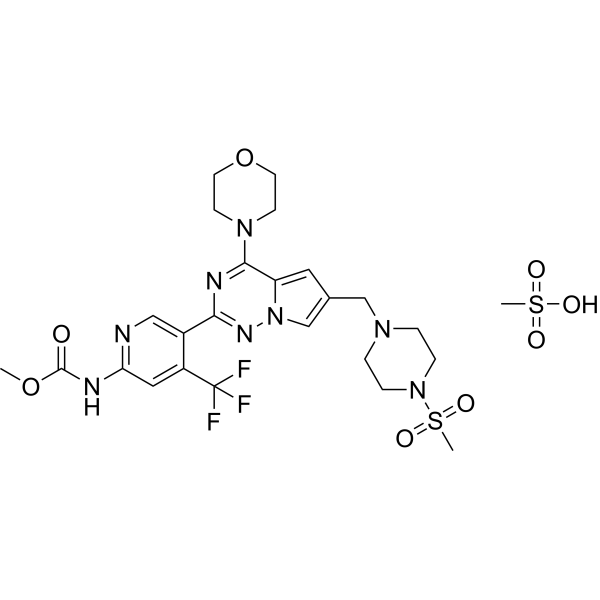
- HY-143462
-
|
|
HDAC
c-Met/HGFR
Apoptosis
|
Cancer
|
|
c-Met/HDAC-IN-2 is a highly potent c-Met and HDAC dual inhibitor with IC50s of 18.49 nM and 5.40 nM for HDAC1 and c-Met, respectively. c-Met/HDAC-IN-2 has antiproliferative activities against certain cancer cell lines. c-Met/HDAC-IN-2 can cause G2/M-phase arrest and induce apoptosis in HCT-116. c-Met/HDAC-IN-2 can be used for researching anti-cancer resistance .
|
-
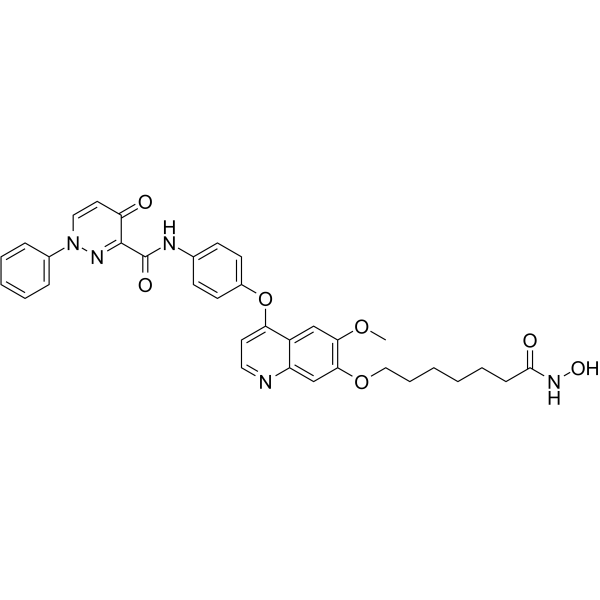
- HY-N10503
-
|
|
Tyrosinase
Ras
Raf
MAPKAPK2 (MK2)
Apoptosis
|
Cancer
|
|
Norartocarpetin is a tyrosinase inhibitor. Norartocarpetin has strong tyrosinase inhibitory activity with an IC50 value of 0.47 μM. Norartocarpetin as an antibrowning agent can be used for the research of food systems. Norartocarpetin also has a significant anticancer activity in lung carcinoma cells (NCI-H460) with an IC50 value of 22 μM. Norartocarpetin has antiproliferative effects are mediated via targeting Ras/Raf/MAPK signalling pathway, mitochondrial mediated apoptosis, S-phase cell cycle arrest and suppression of cell migration and invasion in human lung carcinoma cells .
|
-
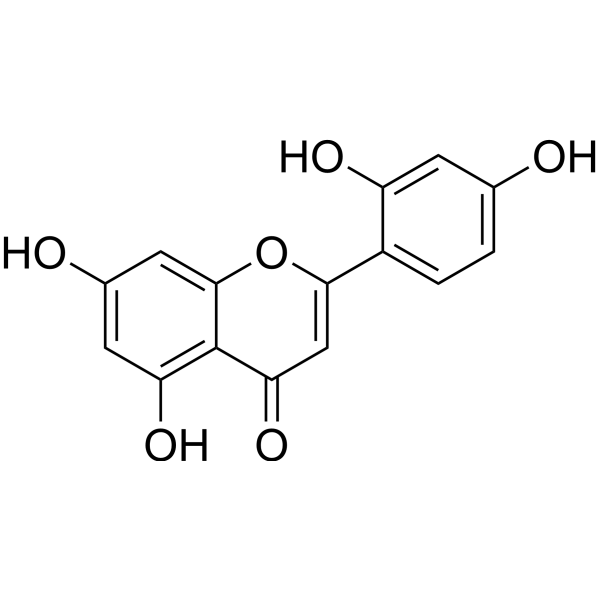
- HY-163288
-
|
|
Histone Methyltransferase
HSP
Apoptosis
|
Cancer
|
|
EZH2/HSP90-IN-29 is a dual inhibitor for EZH2 and HSP90, with IC50s of 6.29 nM and 60.1 nM, for EZH2 and HSP90, respectively. EZH2/HSP90-IN-29 increases apoptosis/necrosis-related gene expression, induces cell cycle arrest at M phase and inhibits reactive oxygen species (ROS) catabolism pathway. EZH2/HSP90-IN-29 is able to cross the blood-brain-barrier (BBB) .
|
-
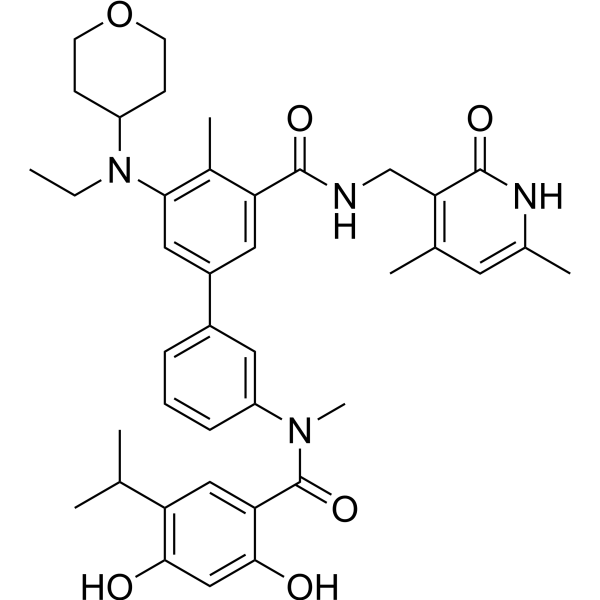
- HY-162308
-
|
|
Histone Methyltransferase
Apoptosis
|
Cancer
|
|
NSD-IN-3 (compound 3) is a potent nuclear receptor binding SET domain (NSD) inhibitor. NSD-IN-3 inhibits NSD2-SET and NSD3-SET with IC50 values of 0.81 μM and 0.84 μM, respectively. NSD-IN-3 inhibits histone H3K36 dimethylation and decreases the expression of NSDs-targeted genes in non-small cell lung cancer cells. NSD-IN-3 induces s-phase cell cycle arrest and apoptosis .
|
-
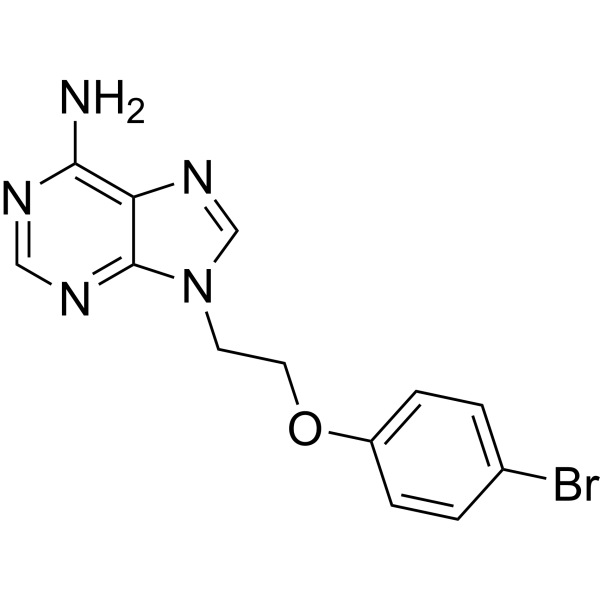
- HY-100513A
-
|
|
Apoptosis
DNA/RNA Synthesis
Antibiotic
|
Cancer
|
|
Dehydroaltenusin is a small molecule selective inhibitor of eukaryotic DNA polymerase α, a type of antibiotic produced by a fungus with an IC50 value of 0.68 μM. The inhibitory mode of action of dehydroaltenusin against mammalian pol α activity is competitive with respect to the DNA template primer (Ki=0.23 µM) and non-competitive with respect to the 2'-deoxyribonucleoside 5'-triphosphate substrate (Ki=0.18 µM) . Dehydroaltenusin arrests the cancer cell cycle at the S-phase and triggers apoptosis . Dehydroaltenusin possesses anti-tumor activity against human adenocarcinoma tumor in vivo .
|
-
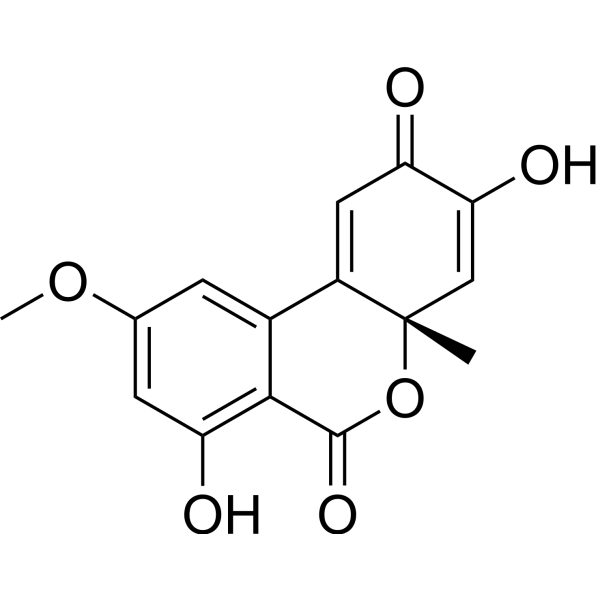
- HY-N0316
-
|
|
NF-κB
Reactive Oxygen Species
Apoptosis
VEGFR
c-Myc
|
Cancer
|
|
Mollugin is an orally active and potent NF-κB inhibitor. Mollugin induces S-phase arrest of HepG2 cells, and increased intracellular reactive oxygen species (ROS) levels. Mollugin induces DNA damage in HepG2 cells, as well as an increase in the expression of p-H2AX. Mollugin shows anti-cancer effect by inhibiting TNF-α-induced NF-κB activation. Mollugin enhances the osteogenic action of BMP-2 (bone morphogenetic protein 2) via the p38-Smad signaling pathway .
|
-
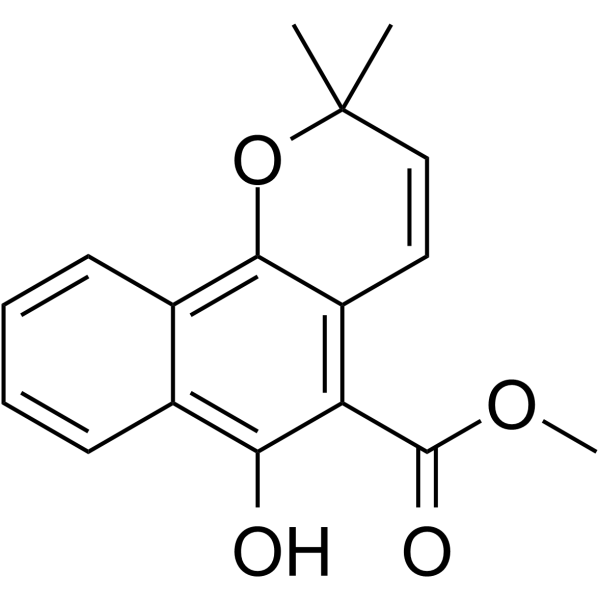
- HY-132231
-
|
|
PI3K
Apoptosis
|
Cancer
|
|
FD223 is a potent and selective phosphoinositide 3-kinase delta (PI3Kδ) inhibitor. FD223 displays high potency (IC50=1 nM) and good selectivity over other isoforms (IC50s of 51 nM, 29 nM and 37 nM, respectively for α, β and γ). FD223 exhibits efficient inhibition of the proliferation of acute myeloid leukemia (AML) cell lines by suppressing p-AKT Ser473 thus causing G1 phase arrest during the cell cycle. FD223 has potential for the research of leukemia such as AML .
|
-
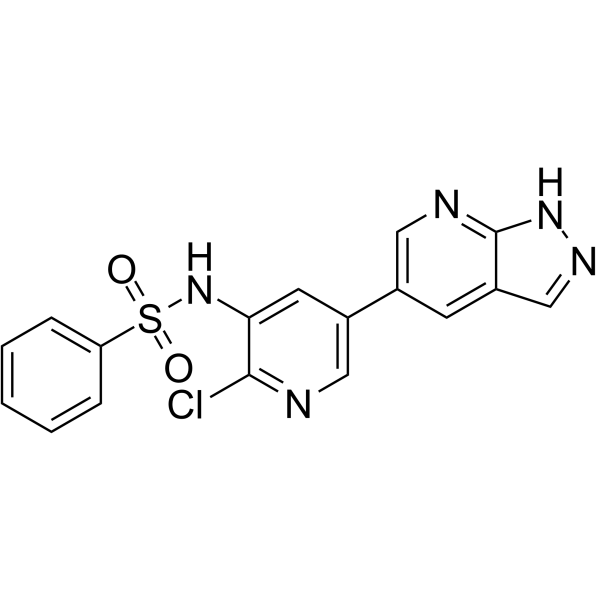
- HY-146443
-
|
|
Raf
|
Cancer
|
|
BRAF V600E/CRAF-IN-2 (Compound 9c) is a potent inhibitor of BRAF V600E/CRAF with IC50s of 0.888 and 0.229 μM, respectively. BRAF V600E/CRAF-IN-2 triggers apoptosis and cell cycle arrest at G0/G1 phase in HCT-116 colon cancer cell. BRAF V600E/CRAF-IN-2 has the potential for the research of cancer diseases .
|
-
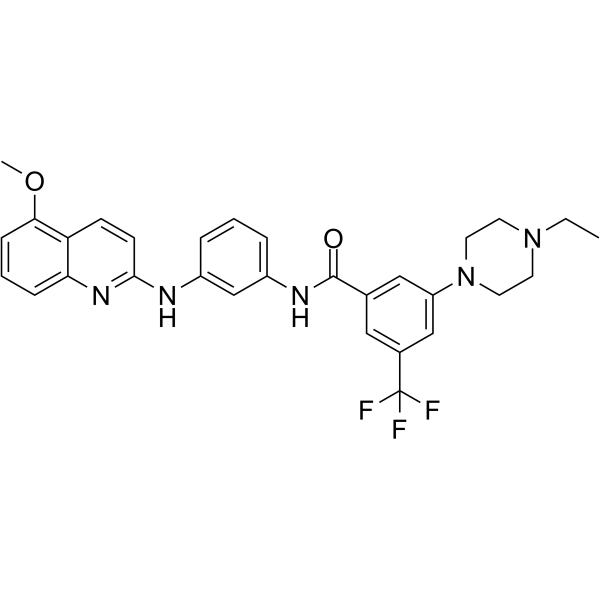
- HY-155965
-
|
|
VEGFR
PARP
Apoptosis
|
Cancer
|
|
VEGFR/PARP-IN-1 (Compound 14b) is a VEGFR/PARP dual inhibitor (IC50s: 191 nM and 60.9 nM respectively). VEGFR/PARP-IN-1 inhibits DNA damage repair, induces cell apoptosis, and arrests cell in the G2/M phase. VEGFR/PARP-IN-1 has good antiproliferative efficacy against BRCA wild-type breast cancer cells (IC50: 4.1 and 3.5 μM for MDA-MB-231 and MCF-7 cells). VEGFR/PARP-IN-1 is an antitumor and anti-metastasis agent .
|
-
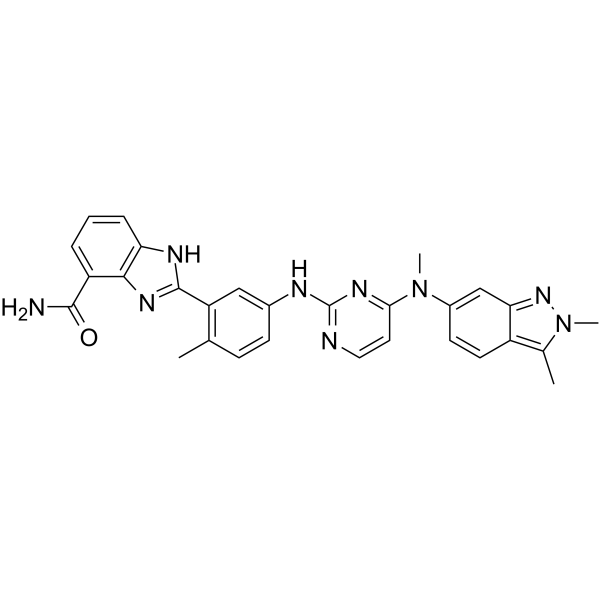
- HY-147825
-
|
|
EGFR
Raf
Apoptosis
|
Cancer
|
|
EGFR/BRAFV600E-IN-1 (Compound 23) is a potent EGFR and BRAF V600E dual inhibitor with IC50s of 0.08 and 0.15 µM, respectively. EGFR/BRAFV600E-IN-1 induces apoptosis and cell cycle arrest in both pre-G1 and G2/M phases. EGFR/BRAFV600E-IN-1 exhibits antiproliferative activity againist A-549, MCF-7, Panc-1, HT-29 with IC50s of 1.2, 0.79, 1.3, and 1.23 µM, respectively .
|
-
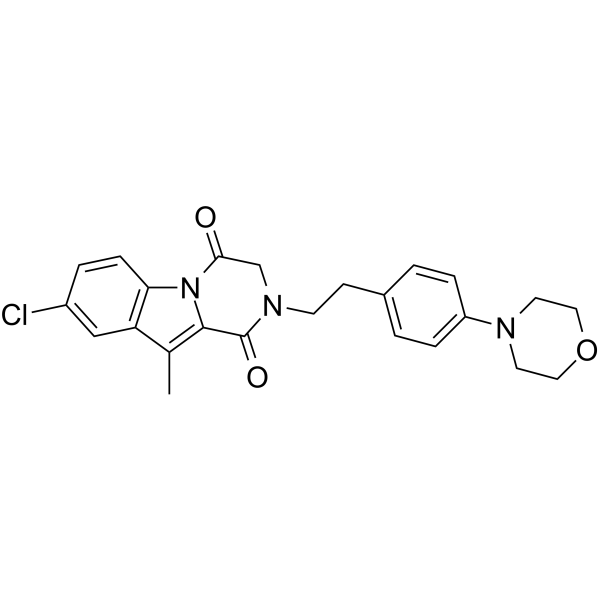
- HY-146749
-
|
|
FLT3
Trk Receptor
Apoptosis
|
Cancer
|
|
FLT3/TrKA-IN-1 is a potent FLT3/TrKA dual kinase inhibitor with the IC50s of 43.8 nM, 97.2 nM, 92.5 nM and 23.6 nM for FLT3, FLT3-ITD, FLT3-TKD and TrKA, respectively. FLT3/TrKA-IN-1 induces cell cycle arrest at the G0/G1 phase as well as apoptosis and shows antiproliferative activity in vitro. FLT3/TrKA-IN-1 has the potential for the research of Acute myeloid leukemia (AML) .
|
-
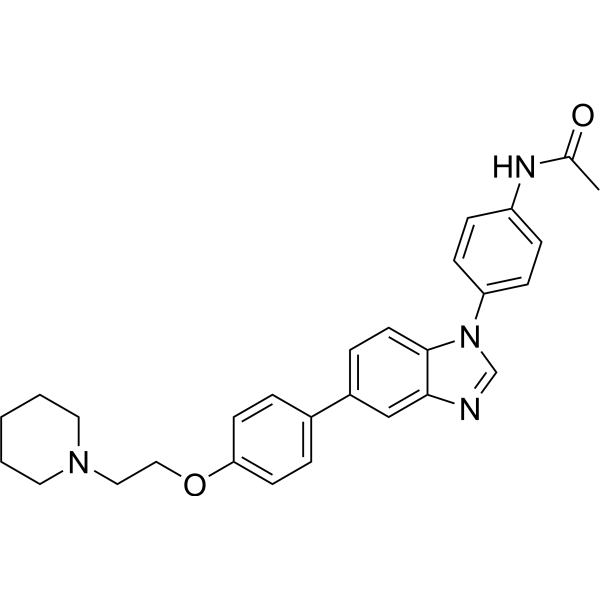
- HY-149407
-
|
|
VEGFR
CDK
EGFR
Necroptosis
Apoptosis
|
Cancer
|
|
Multi-kinase-IN-4 (compound 5d) is multi-targeted kinase inhibitor, including VEGFR2, EGFR, HER2, and CDK2, with IC50 values of 0.33, 0.22, 0.18 and 2.09 μM, respectively. Multi-kinase-IN-4 shows broad-spectrum anti-cancer activities against HepG2, MCF-7, MDA-231, and HeLa cell lines (IC50 = 1.94–7.1 µM), but exhibits lower toxicity in the WI-38 cells (IC50 = 40.85 µM). Multi-kinase-IN-4 induces apoptosis and arrests cell cycle at S phase in HepG2 cells. Multi-kinase-IN-4 has the potential for the research of cancer .
|
-
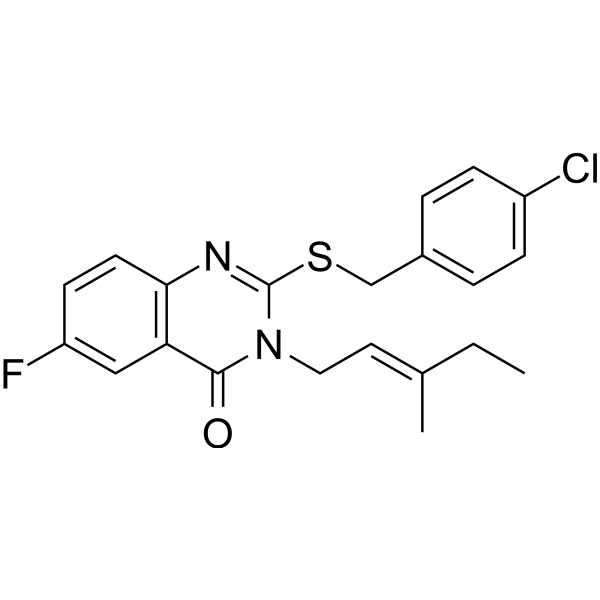
- HY-158117
-
|
|
Apoptosis
Autophagy
|
Cancer
|
|
[Cu2Cl2(4'-(4-Methoxy-1-naphthyl)-terpy)2](PF6)2 (Compound 3) is a copper complex, which inhibits cell viability of HCT116, HCT116DoxR, A2780 and fibroblasts, with IC50s of 0.13, 0.15, 0.66 and 6.24 μM, respectively. [Cu2Cl2(4'-(4-Methoxy-1-naphthyl)-terpy)2](PF6)2 induces apoptosis and autophagy, and arrests cell cycle at G0/G1 phase in HCT116DoxR. [Cu2Cl2(4'-(4-Methoxy-1-naphthyl)-terpy)2](PF6)2 exhibits antimetastatic efficacy .
|
-
2](//file.medchemexpress.com/product_pic/hy-158117.gif)
| Cat. No. |
Product Name |
Type |
-
- HY-B2201
-
|
Sodium citrate; Trisodium citrate anhydrous
|
Biochemical Assay Reagents
|
|
Citric acid trisodium is a natural preservative and food tartness enhancer. Citric acid trisodium induces apoptosis and cell cycle arrest at G2/M phase and S phase. Citric acid trisodium cause oxidative damage of the liver by means of the decrease of antioxidative enzyme activities. Citric acid trisodium causes renal toxicity in mice .
|
| Cat. No. |
Product Name |
Target |
Research Area |
-
- HY-113638
-
|
GS-456332
|
Stearoyl-CoA Desaturase (SCD)
Apoptosis
|
Cancer
|
|
CVT-11127 is a potent SCD inhibitor. CVT-11127 induces apoposis and arrests the cell cycle at the G1/S phase. CVT-11127 has the potential for the research of lung cancer .
|
-
- HY-P1032S1
-
|
|
Isotope-Labeled Compounds
Endogenous Metabolite
|
Others
|
|
Angiotensin I- 13C5, 15N (human, mouse, rat) is the 13C and 15N labeled Angiotensin I (human, mouse, rat) (HY-P1032). Citric acid is a natural preservative and food tartness enhancer. Citric acid induces apoptosis and cell cycle arrest at G2/M phase and S phase in HaCaT cells. Citric acid cause oxidative damage of the liver by means of the decrease of antioxidative enzyme activities. Citric acid causes renal toxicity in mice .
|
| Cat. No. |
Product Name |
Category |
Target |
Chemical Structure |
| Cat. No. |
Product Name |
Chemical Structure |
-
- HY-13605S
-
|
|
|
Cytarabine-d2 is the deuterium labeled Cytarabine. Cytarabine, a nucleoside analog, causes S phase cell cycle arrest and inhibits DNA polymerase. Cytarabine inhibits DNA synthesis with an IC50 of 16 nM. Cytarabine has antiviral effects against HSV[1][2].
|
-

-
- HY-N1428S4
-
|
|
|
Citric acid- 18O is 18O-labeled Citric acid (HY-N1428) Citric acid is a natural preservative and food tartness enhancer. Citric acid induces apoptosis and cell cycle arrest at G2/M phase and S phase in HaCaT cells. Citric acid cause oxidative damage of the liver by means of the decrease of antioxidative enzyme activities. Citric acid causes renal toxicity in mice.
|
-

-
- HY-N1428S6
-
|
|
|
Citric acid-d4-1 is deuterated labeled Citric acid (HY-N1428) Citric acid is a natural preservative and food tartness enhancer. Citric acid induces apoptosis and cell cycle arrest at G2/M phase and S phase in HaCaT cells. Citric acid cause oxidative damage of the liver by means of the decrease of antioxidative enzyme activities. Citric acid causes renal toxicity in mice.
|
-

-
- HY-N1428S3
-
|
|
|
Citric acid- 13C3 is the 13C labeled Citric acid[1]. Citric acid is a natural preservative and food tartness enhancer. Citric acid induces apoptosis and cell cycle arrest at G2/M phase and S phase in HaCaT cells. Citric acid cause oxidative damage of the liver by means of the decrease of antioxidative enzyme activities. Citric acid causes renal toxicity in mice[2][3][4].
|
-

-
- HY-N0273S
-
|
|
|
Brassinolide-d5 (Brassin lactone-d5) is the deuterated labeled Brassinolide (HY-N0273). Citric acid is a natural preservative and food tartness enhancer. Citric acid induces apoptosis and cell cycle arrest at G2/M phase and S phase in HaCaT cells. Citric acid cause oxidative damage of the liver by means of the decrease of antioxidative enzyme activities. Citric acid causes renal toxicity in mice .
|
-

-
- HY-P1032S1
-
|
|
|
Angiotensin I- 13C5, 15N (human, mouse, rat) is the 13C and 15N labeled Angiotensin I (human, mouse, rat) (HY-P1032). Citric acid is a natural preservative and food tartness enhancer. Citric acid induces apoptosis and cell cycle arrest at G2/M phase and S phase in HaCaT cells. Citric acid cause oxidative damage of the liver by means of the decrease of antioxidative enzyme activities. Citric acid causes renal toxicity in mice .
|
-

-
- HY-W016099S
-
|
|
|
3-Methyl-2-quinoxalinecarboxylic acid-d4 is the deuterium labeled 3-Methyl-2-quinoxalinecarboxylic acid. 3-Methyl-2-quinoxalinecarboxylic acid (MQCA), an important N-oxide reductive metabolite of Quinocetone or Olaquindox, potently inhibits the growth of Chang liver cells through S phase arrest of the cell cycle[1].
|
-

Your information is safe with us. * Required Fields.
Inquiry Information
- Product Name:
- Cat. No.:
- Quantity:
- MCE Japan Authorized Agent:


























































































































2](http://file.medchemexpress.com/product_pic/hy-158117.gif)


